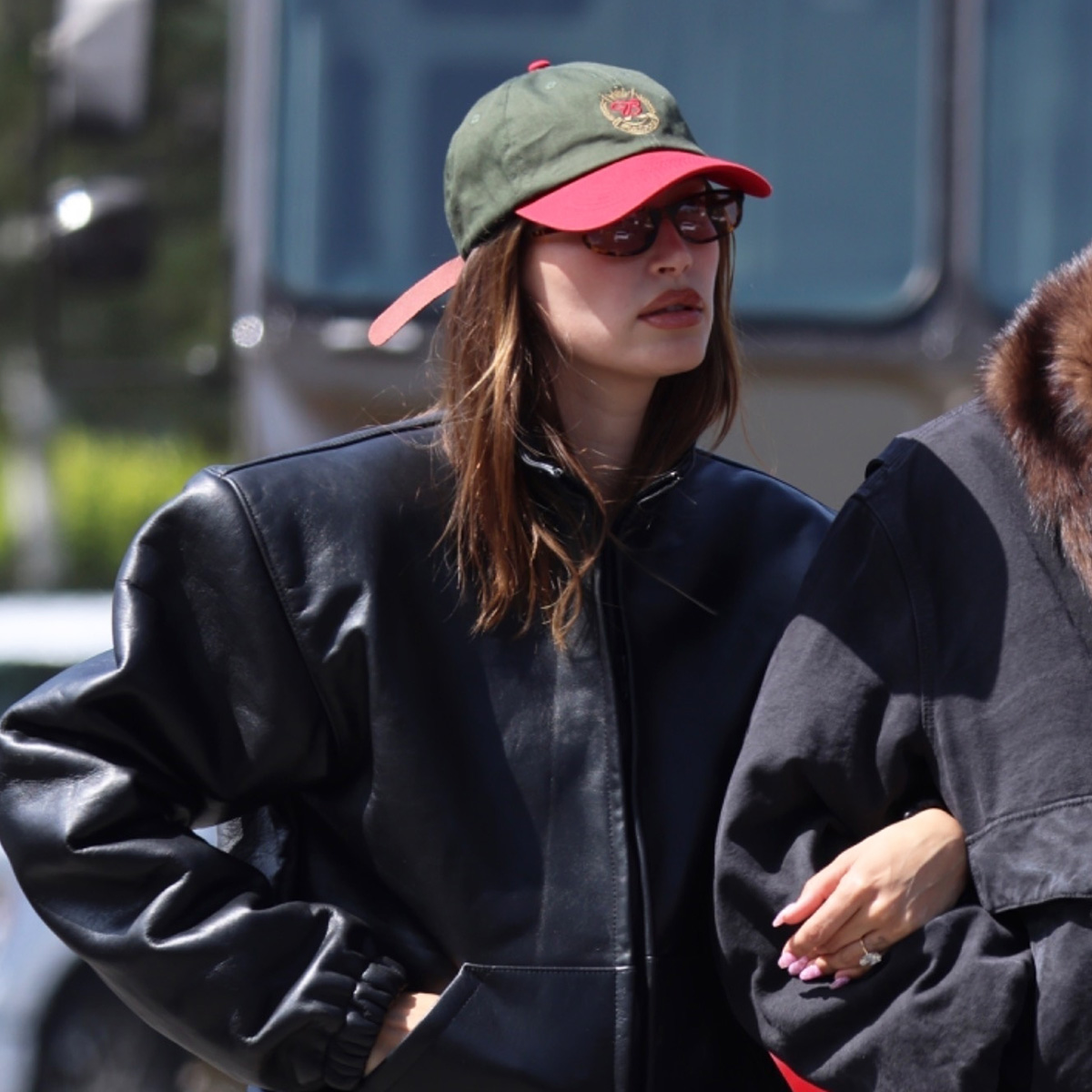Fashion Girls Are All Over These Stunning Face Masks, and I Can See Why

Welcome to our newest editorial initiative, Who What Wear Spotlight, where we'll be using our editorial platform, social following, and ad inventory to turn the spotlight on small businesses that need our support now more than ever. Each week, we'll be highlighting a new fashion or beauty company. If you own a small brand and would like to be considered for the program, please apply here.
Since the pandemic hit, many industries have been flipped on their heads. Within the fashion world, everything from scale and consumerism to luxury and runway has been brought into question. Fashion brands on all levels are forced, right now, to consider their place and reposition themselves for a different economy and lifestyle. Fashion designer Roopa Pemmaraju is employing the sustainable and socially responsible ethos she's always had to guide herself and her eponymous label through it. Her luxury brand employs artisans in her hometown of Bangalore, India, and her main priority has been ensuring her employees still have work and income during these turbulent times. It's meant finding a solution that could justify reopening cotton mills and digital printers so the artisans can get back to work. Face masks, to no surprise, were the answer.
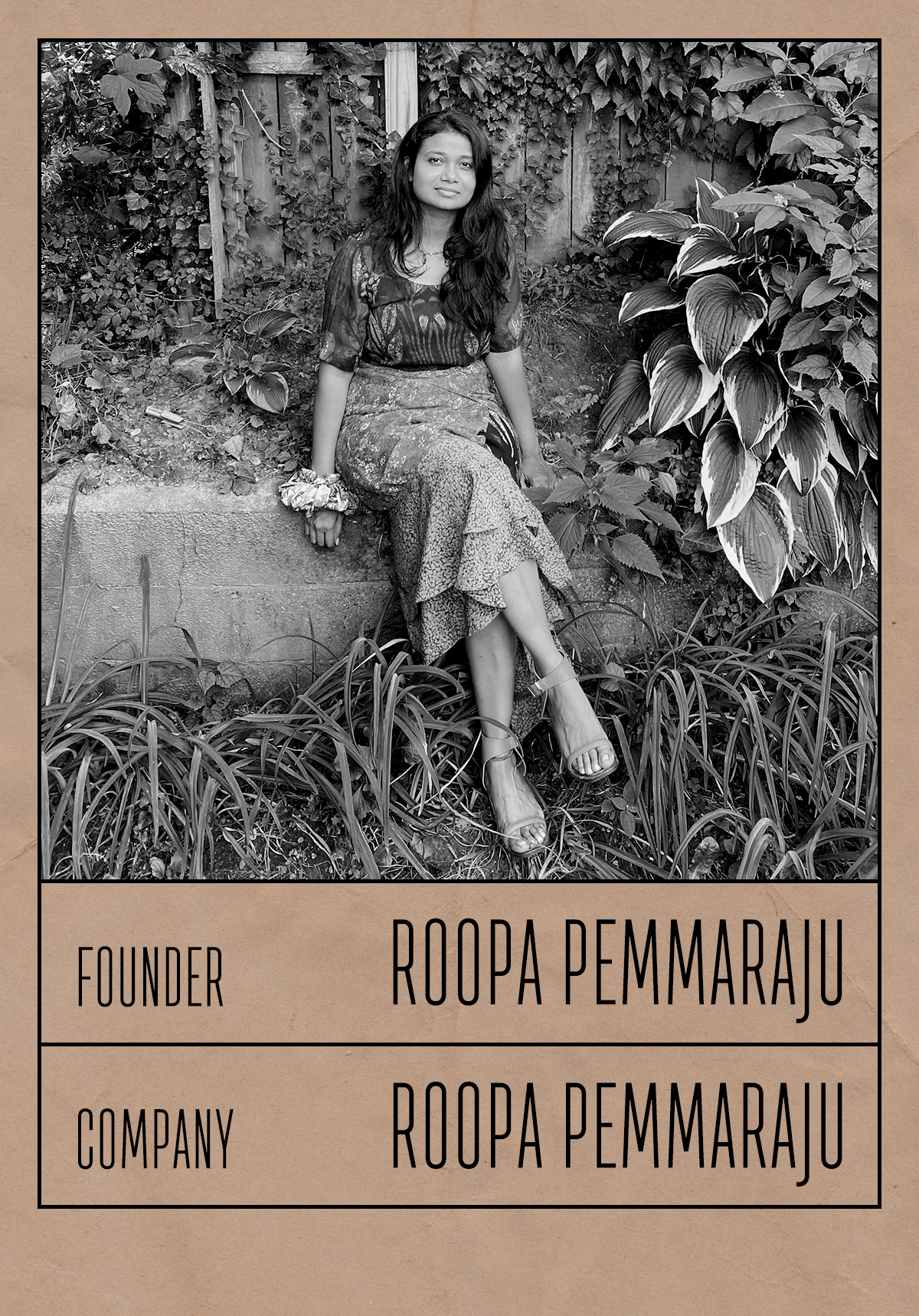
Tell us about yourself and your business.
I’m Roopa Pemmaraju. I am the founder of the namesake company. I was born and raised in Bengaluru, India, and started my company in Melbourne, Australia. I currently live in New York. My brand, Roopa Pemmaraju, is a slow luxury fashion brand, with an emphasis on sustainability and social responsibility. Every garment we create uses natural materials and processes that are carbon-neutral, with each sale going back to supporting the skilled artisans and their families.
And if you had to sum up your business in five or so words?
Socially conscious, sustainable, luxury slow fashion.
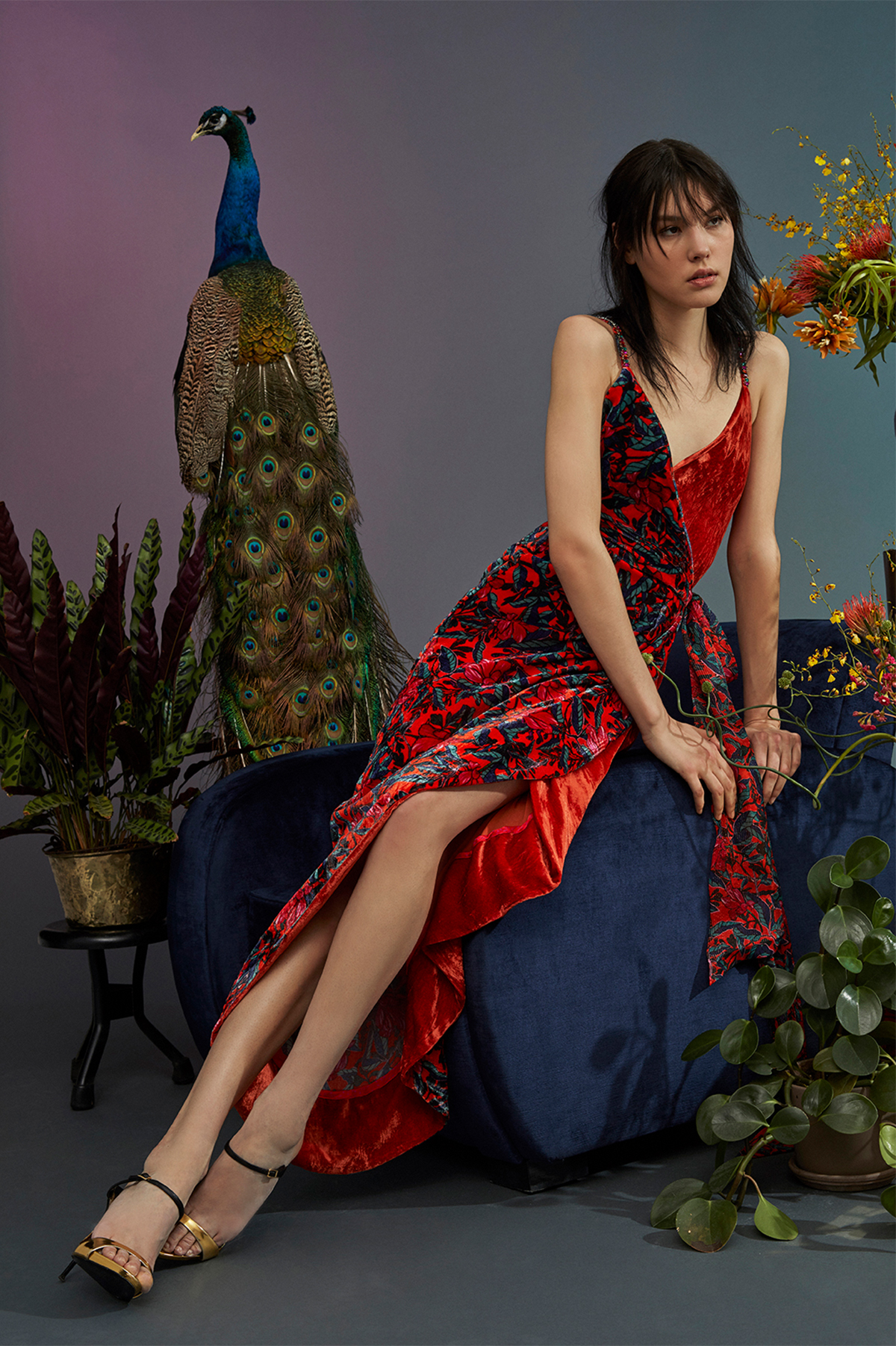
What inspired you to start your business?
When I grew up in Bangalore and later moved to Australia, I became infatuated with the patterns used in indigenous Australian and Indian art. While living in Australia, I had the idea of using their art and putting it onto garments, then giving back to the talented artisans in this region. I felt that indigenous Australian and Indian cultures, who are known for their textiles and pattern work, were not being properly represented in the fashion industry as much as they should be, and I wanted to showcase their work to a new set of eyes who would appreciate it while giving back to the talented people who create these works of art. I started this brand on the value of supporting the artisans through the craft they worked hard to perfect and keeping these traditions alive so the next generation can learn and enjoy them.
How have social distancing and stay-at-home orders affected your business? How have your priorities shifted?
They've had an impact on our business. Adjusting our atelier in Bangalore to be a place where all the artisans are safe took a little bit of time and adjusting. Adjusting to the stay-at-home orders has definitely affected me here in the States. I just moved to New York in September, and with the lockdowns and social distancing, it has been difficult to meet people in the industry. I had to approach this differently, utilizing more digital means to get in contact with my team and possible partners.
Another way the lockdowns have affected my business in the U.S. is that I have been unable to set up my office due to the lockdowns, and I had to become accustomed to working out of my 1200 square-foot apartment. I quickly learned it's pretty hard to pack over 600 orders of face masks in such a small space, but I make it work.
Before all this was going on, we were focusing much more on ready-to-wear. Now, our focus has been more on our face-mask line. Due to the pandemic, we have been backlogged on masks, but the success of the line has allowed us to get our products in the hands of so many new customers while giving back to the artisans and lessening the struggle they are facing.
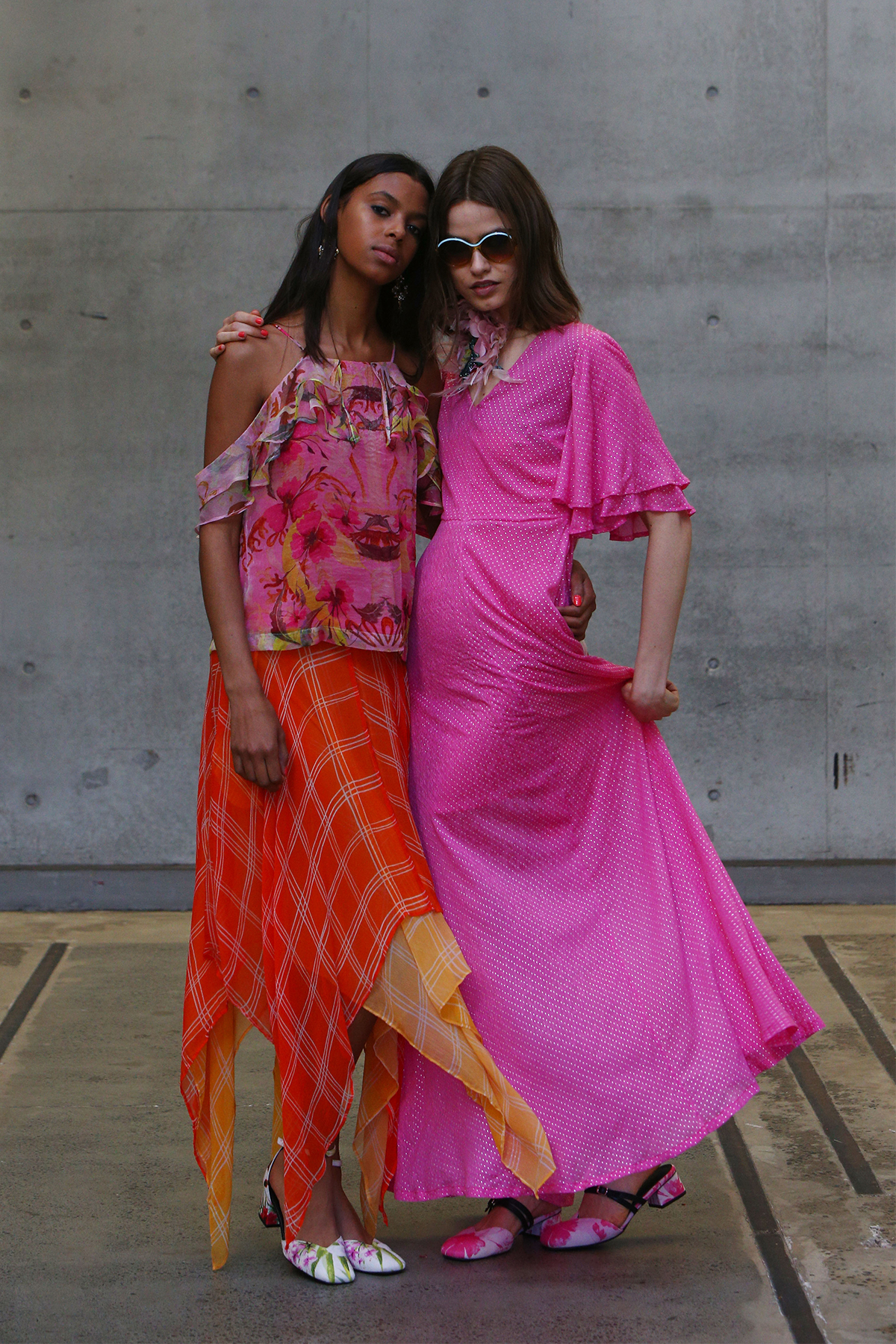
Can you tell us about your decision to sell face masks?
Certainly. Back in March, the pandemic was hitting both the United States and India very hard. A lot of companies were canceling orders, and many people were losing their jobs. In India, people were starving and losing their homes—the fear of starving was becoming a bigger fear than the virus itself. In the United States, the virus was spreading exponentially, and many were dying, while the scarcity of face masks did not help the issue. It broke my heart to see both the place I live and the place I grew up hit so hard, and I knew I had to do something to help.
I did not have a lot of money and was left with a dilemma: Do I put the money back into my business to advertise and hopefully grow in the long run or give the money back to the artisans to help them in the present? I decided to give the money to the artisans, helping them afford their homes and put food onto the table. While they were able to sustain themselves for a short time, I had to come up with a way to get them back to work so we could continue to support them. We had a large collection of archival prints and hand-embroidered fabrics that we had not used, so I reworked them into face masks.
With no money to traditionally advertise them, I had to take a different approach. I posted the designs onto my social media platforms while also reaching out to publications and retailers. Luckily, we were shared by Vogue in their "Cloth Masks to Shop Now” article, which became vital in bringing our products and ethos in front of as many as possible. Anthropologie also played a vital role, as minutes after I reached out, they responded saying they loved the masks and put in an order for 28,000 from our lower-priced line, which was still sustainable. I was ecstatic. I was finally able to get these digital printers, cotton mills, and artisans crafters back to work and provide a means in which they could start to support themselves and their families again. We donated thousands of masks in India and the U.S. to ensure the safety of our artisans and help stop the spread the best way we could.
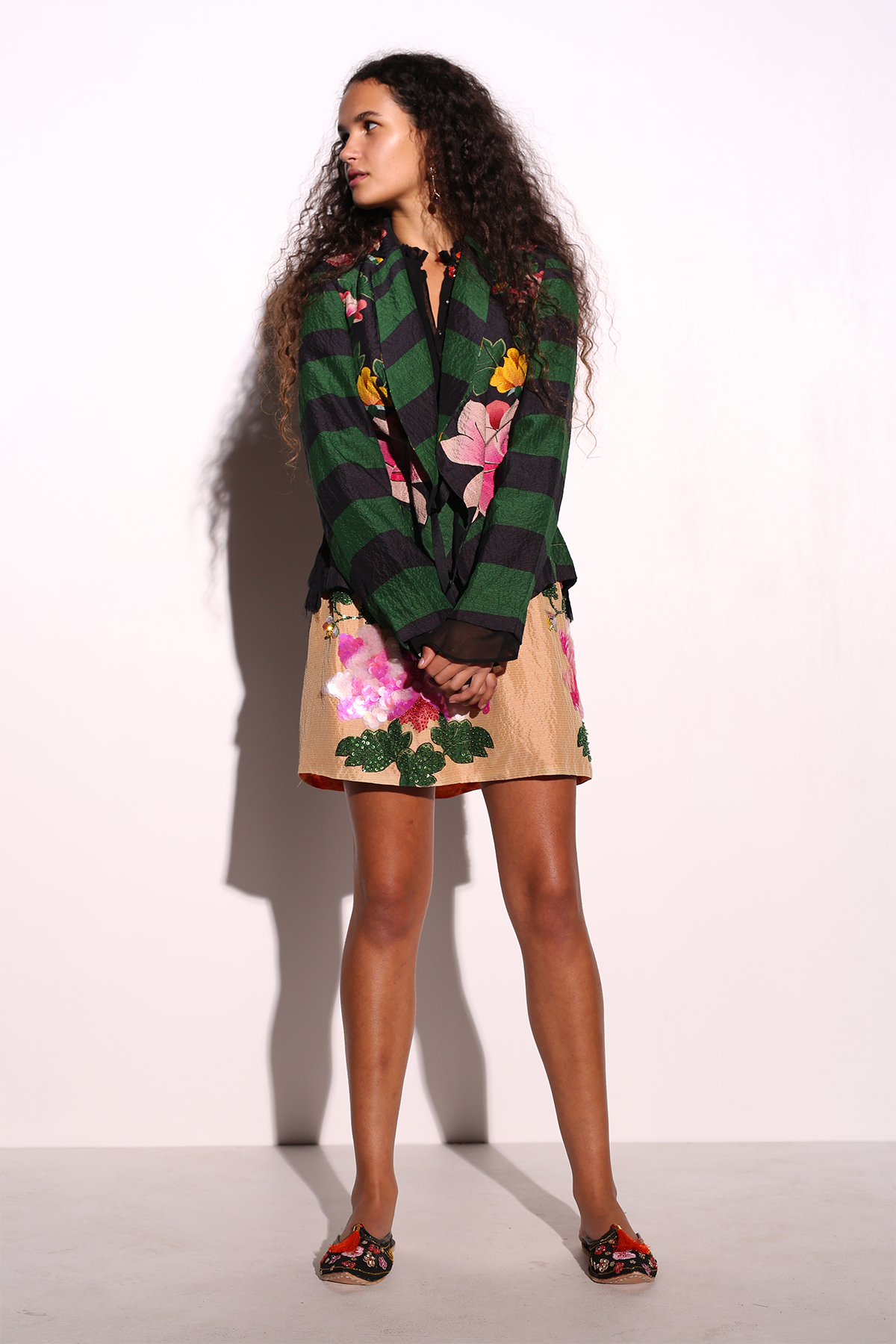
The masks themselves are so beautiful. Can you tell us about how you approached designing them?
When I was first creating our mask line, I used prints and hand-embroidered designs from our archives, giving designs we hadn’t used a new life. We have begun to use patterns and designs from our newer collections to add depth and diversity to each collection. We always try to incorporate hand embroidery into as many designs as we can. It takes a lot of skill to create but adds exquisite details that people love, and this hand process will hold up for years. We encourage our garments to be passed down through generations, just like the processes we use.
How is selling face masks allowing your business to give back?
Selling face masks has allowed us to continue supporting the artisans when they need it most since all the proceeds are going back to them. We've not only been able to help the artisans get back to work but also the digital printers and cotton mills. Each sale of a face mask allows us to donate a mask back to one of the artisans and gives them a means to put food on the table and keep their homes. In a less developed country like India, many people live day to day or week to week. Not working could cause them to become homeless or starve.
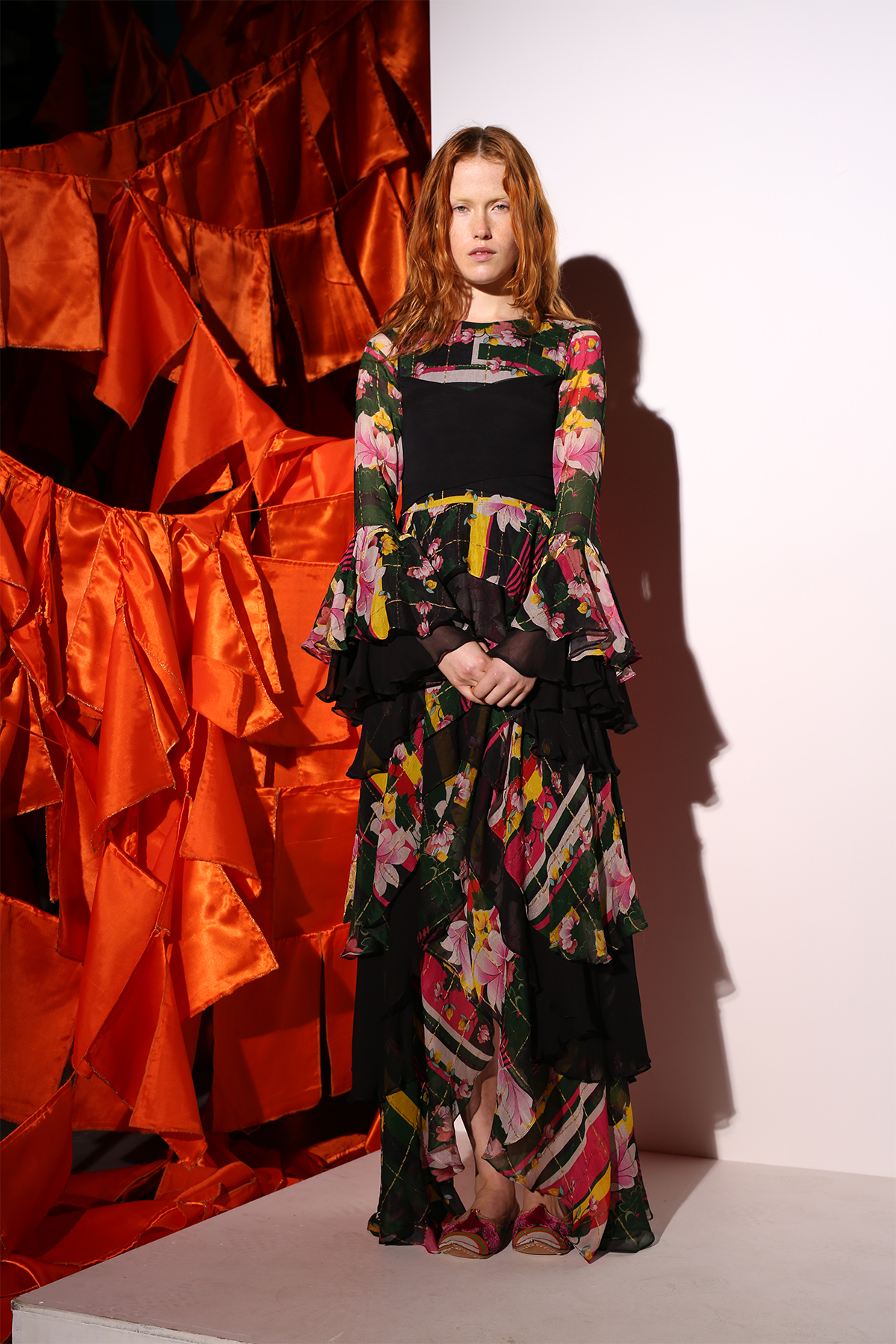
Can you tell us why you feel so passionately about giving back as a business owner?
I feel that as a business owner, it’s my responsibility to protect the planet and people who work hard to create these beautiful garments. When I had to decide where to put the last of my money, I chose the artisans because these are real people who needed my help now more than ever. They did not know what they were going to do for work to feed their families and keep roofs over their heads. Seeing these people starving, and some even taking their own lives due to this, is what makes me feel so passionately about giving back and ultimately prompted my decision to do so.
I wanted to support them at that moment so I could lessen the impact while searching for a more sustainable solution. Looking back, I know I made the right decision in the early days, and now with this face-mask line, they are able to have a job and be in a better place than they were before. Going forward, I hope to provide more for them.
What has been your proudest moment as a business owner?
Right now. Being able to save the lives of many artisans through the creation of a solution that benefits a whole community is what makes me proud. We are able to keep great people here with us and sustain lives and livelihoods. Our collaboration with Anthropologie helped in this mission, as the lower-priced collection provides a sustainable and colorful product everyone can enjoy while helping the people in our Bengaluru atelier struggle less. Being able to positively have an impact on people in both the U.S. and in India has been my proudest moment.
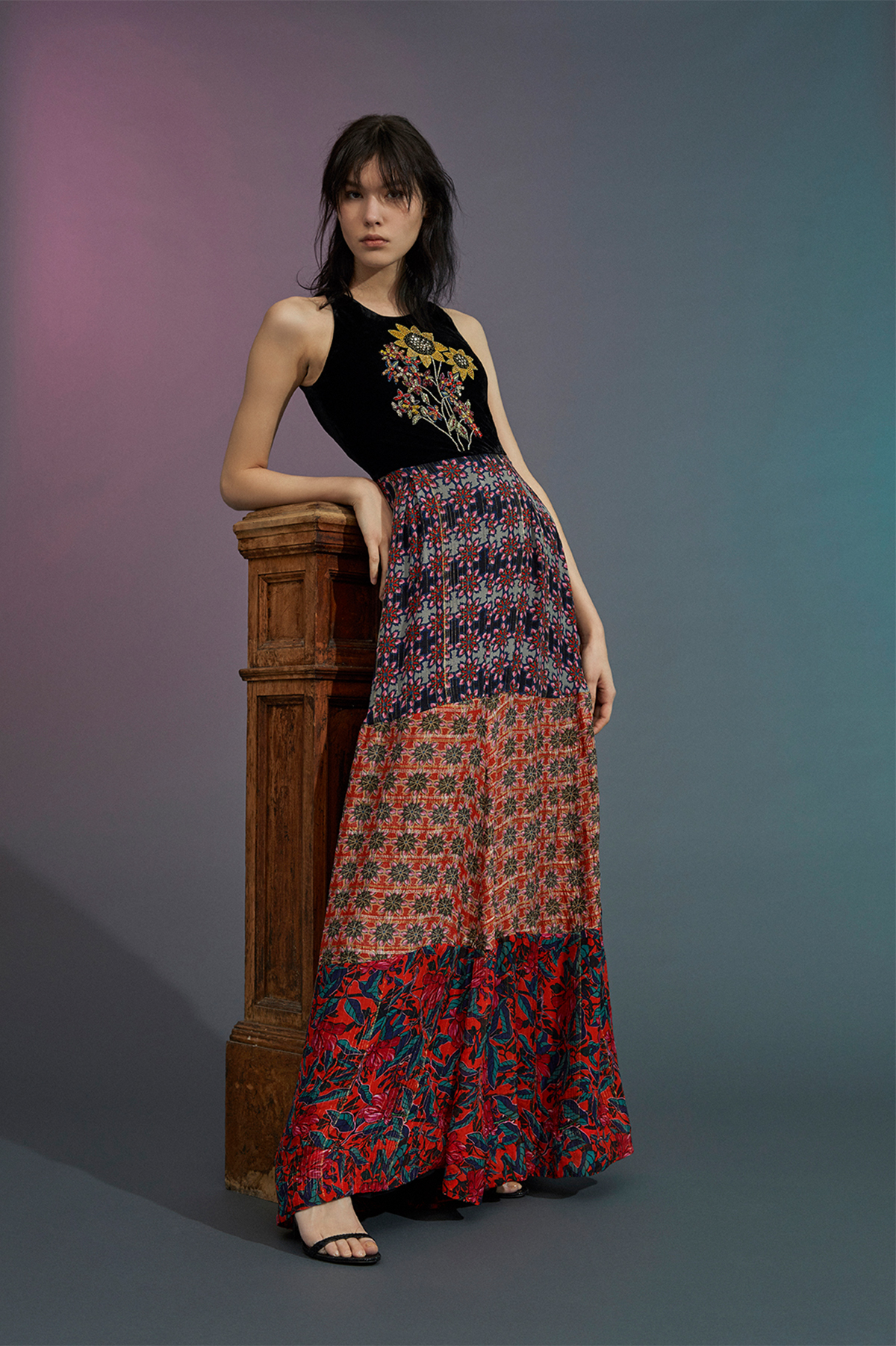
Let's give a little spotlight love to other brands. What are 2-3 of your favorite brands you like to support and why?
Ming Yu Wang, a jewelry company designed by Jennifer Wang. I love her designs, as they are so timeless but truly embody wearable art. Another part of Ming Yu Wang that makes me love to support them is their focus on sustainability. They use 100% recycled brass and .925 sterling silver. Along with the use of recycled materials, they donate 10% of their online sales to World Wildlife Fund.
Jolii Cosmetics, a cosmetics company by Sasha Suresh, who grew up in India and Thailand. I like supporting Jolii Cosmetics because all of their cosmetics are cruelty-free, natural, and vegan. I love supporting brands who care as much about the environment and social responsibility as much as we do.
Shop Roopa Pemmaraju Masks
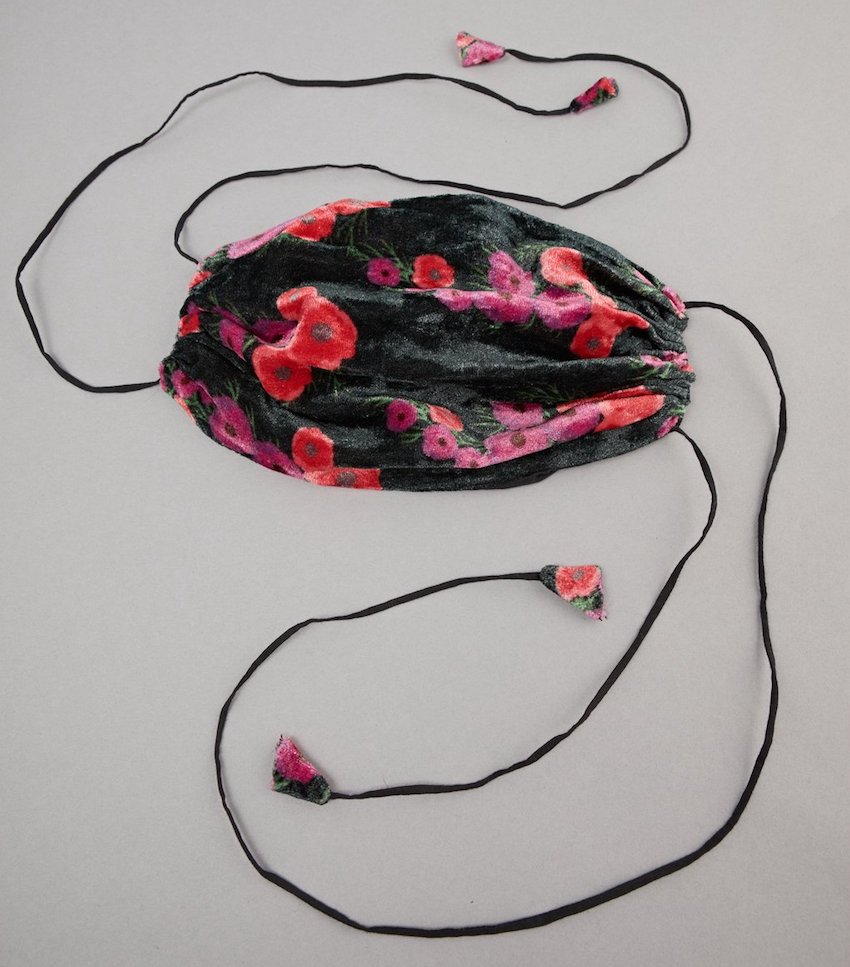
"From our newest collection titled Night Garden, this silk mask takes its inspiration from a garden that blooms in the dark, more specifically the four o’clock flower, which is one of the night-blooming flowers that is native to India."
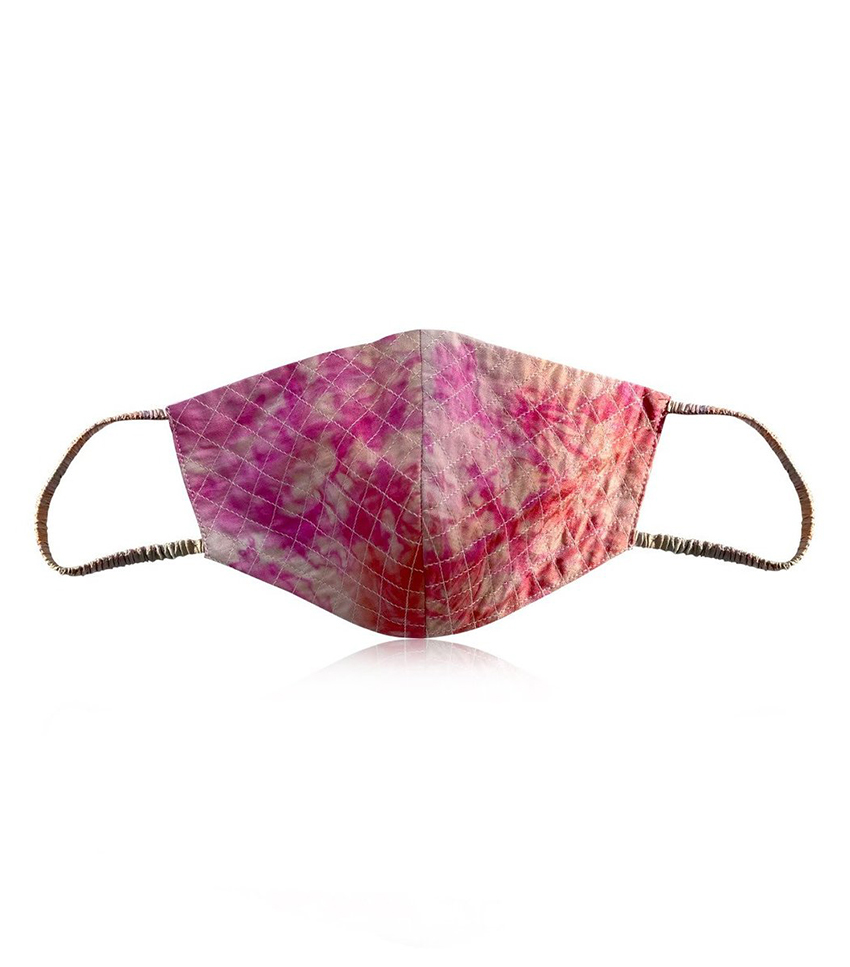
"This mask is made from silk, multilayered for the wearer’s protection and naturally hand tie-dyed by our artisans using natural dyes. We love the look of tie-dye, and it was something I wanted to try."
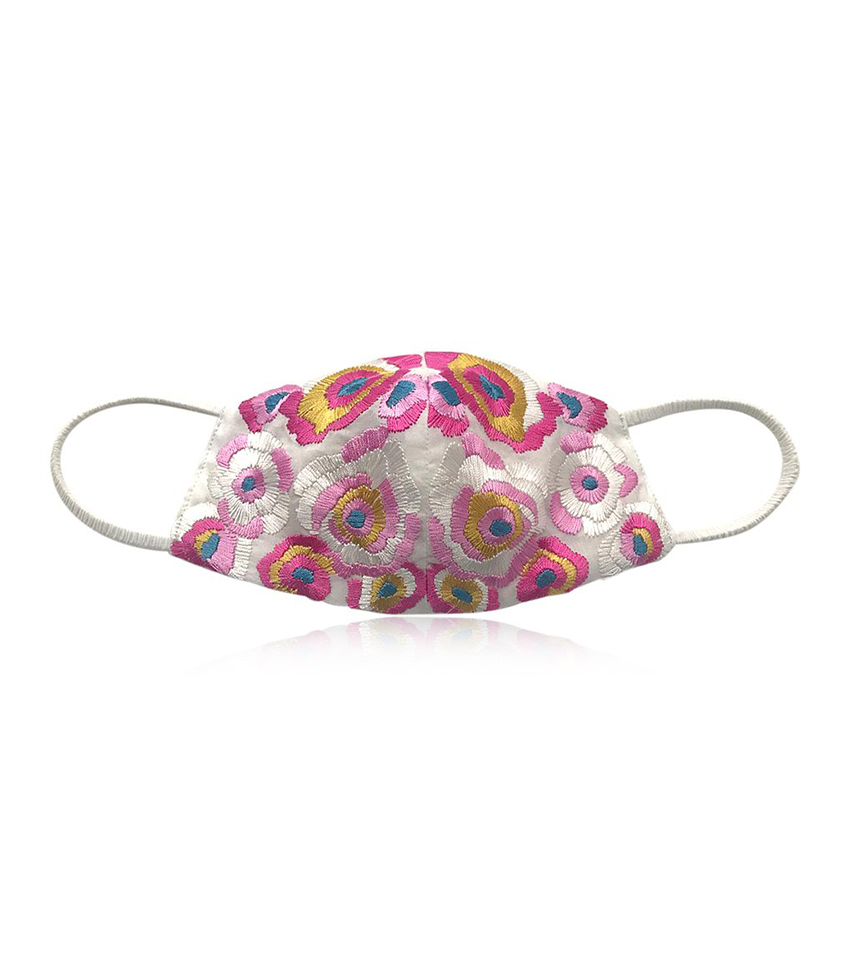
"Part of our summer mask collection, this cotton mask features blue, pink, and yellow floral hand embroidery, adorned by our team of skilled artisans."
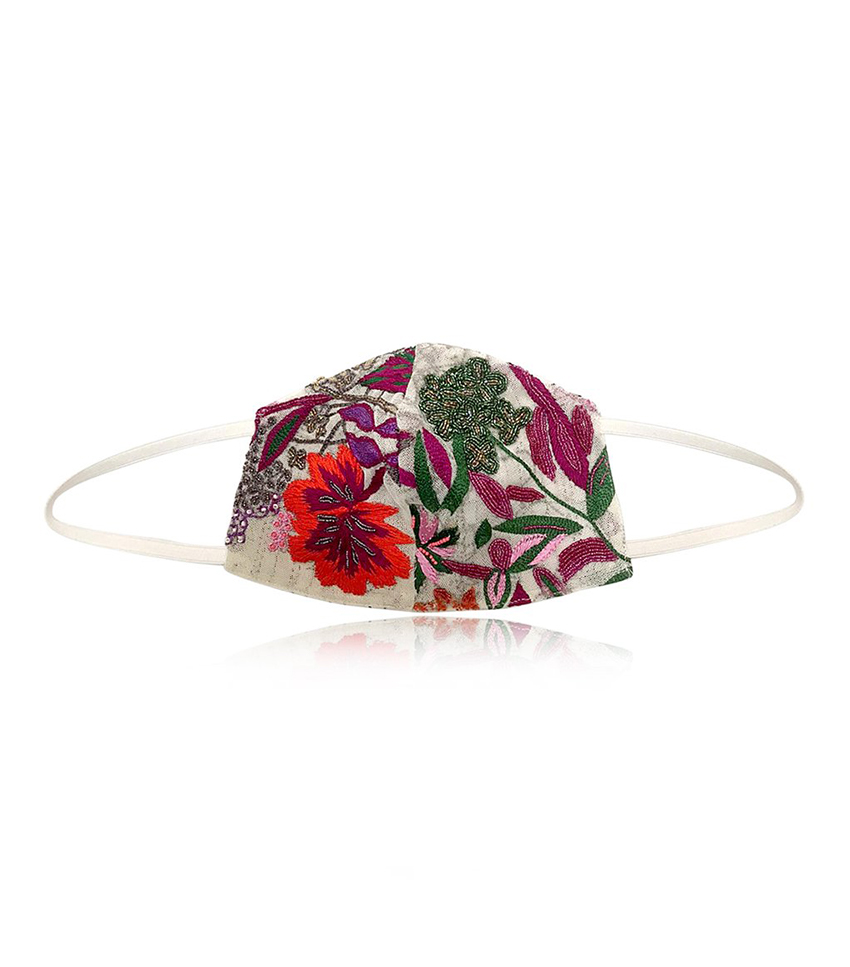
"Our most popular mask and one of the first from our face-mask line. This mask is made from silk and features a beautiful floral scene that runs throughout the mask. All of the imagery is hand embroidered using silk thread and colored and glass beads."
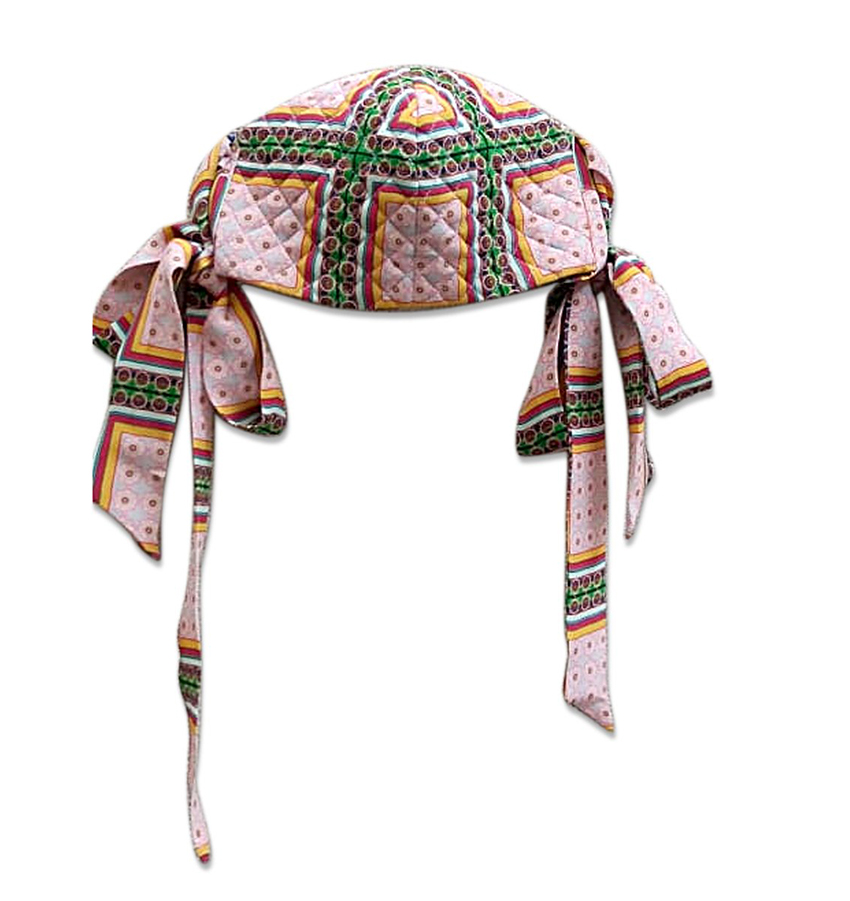
"One of the most unique styles from the silhouette perspective, this multilayered face mask is made from silk and features four bow-tie tassels to tie around the wearer’s face."
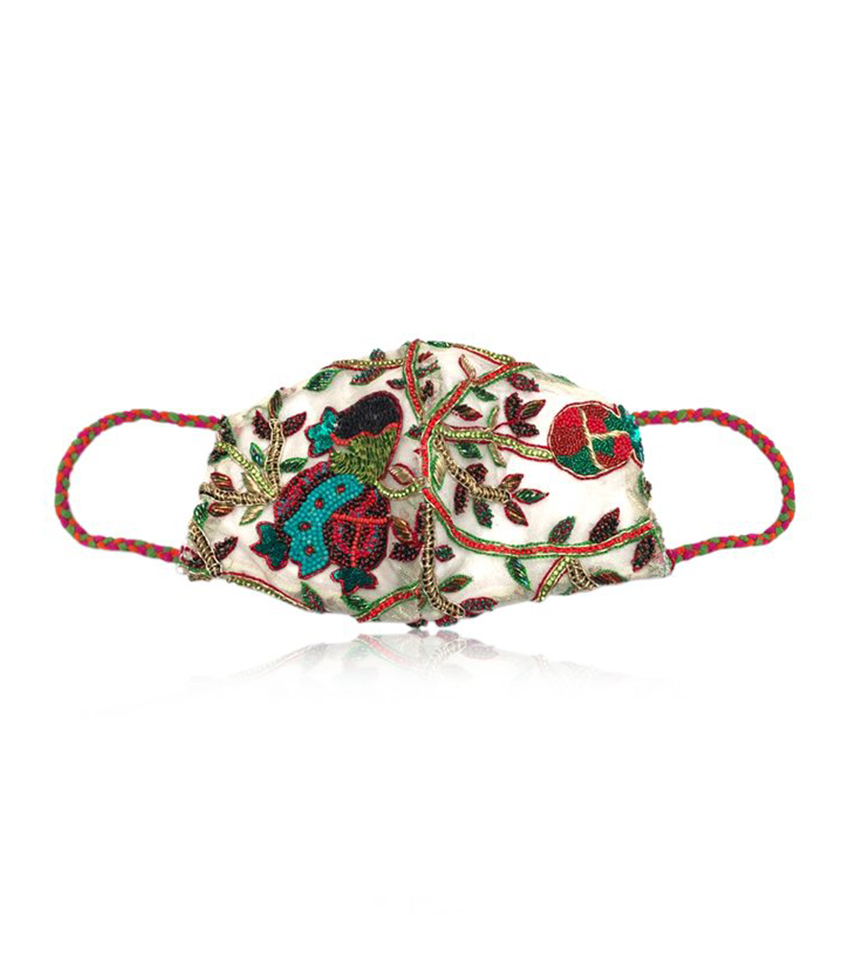
"This silk mask’s intricate design features a wide variety of greens, reds, and blues to create a scene of a pomegranate tree."
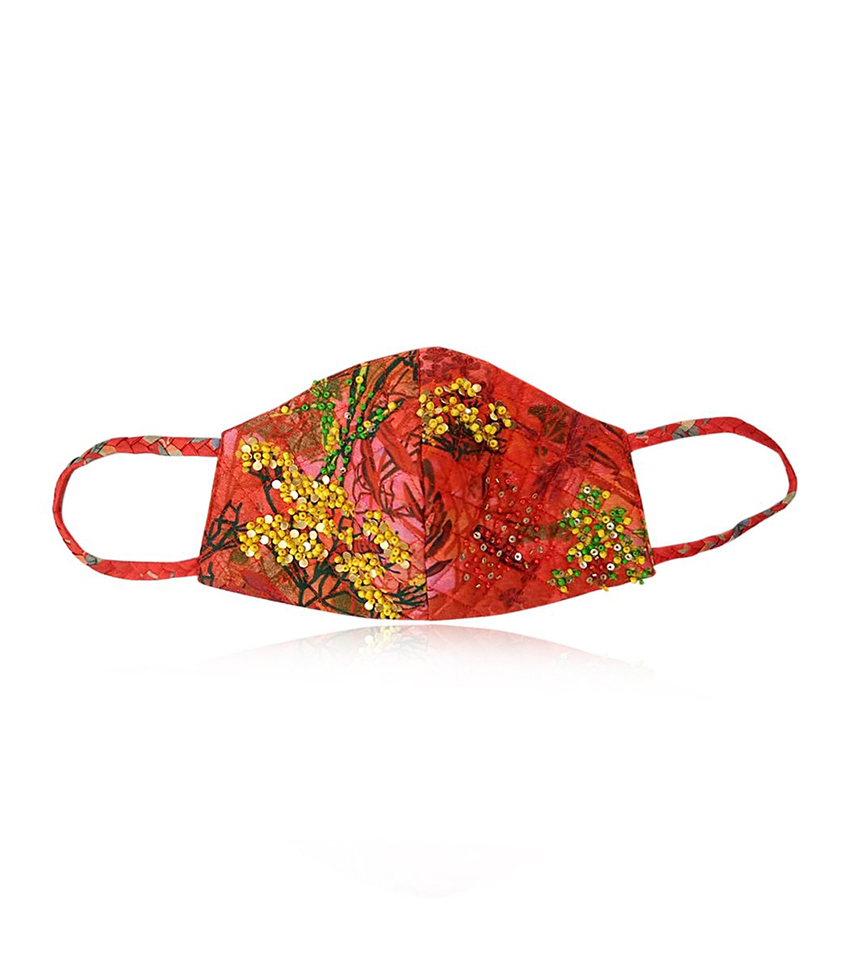
"This mask is cut from silk and features an orange floral-printed base along with hand-embroidered beads and glass detailing that creates a stunning layer of color over the floral print."
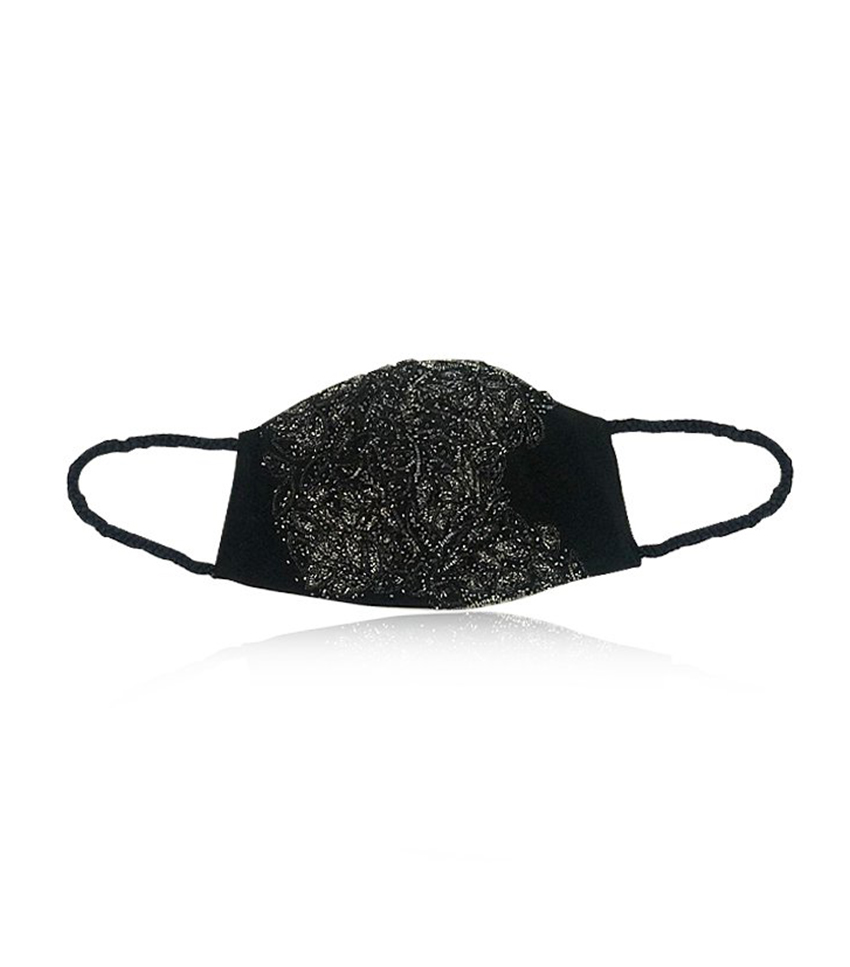
"This black silk mask features hundreds of small metallic and glass beads hand embroidered throughout. This is one of our most time-consuming masks, but the beauty in the details is something unmatched. A statement garment that can blend effortlessly with any outfit."
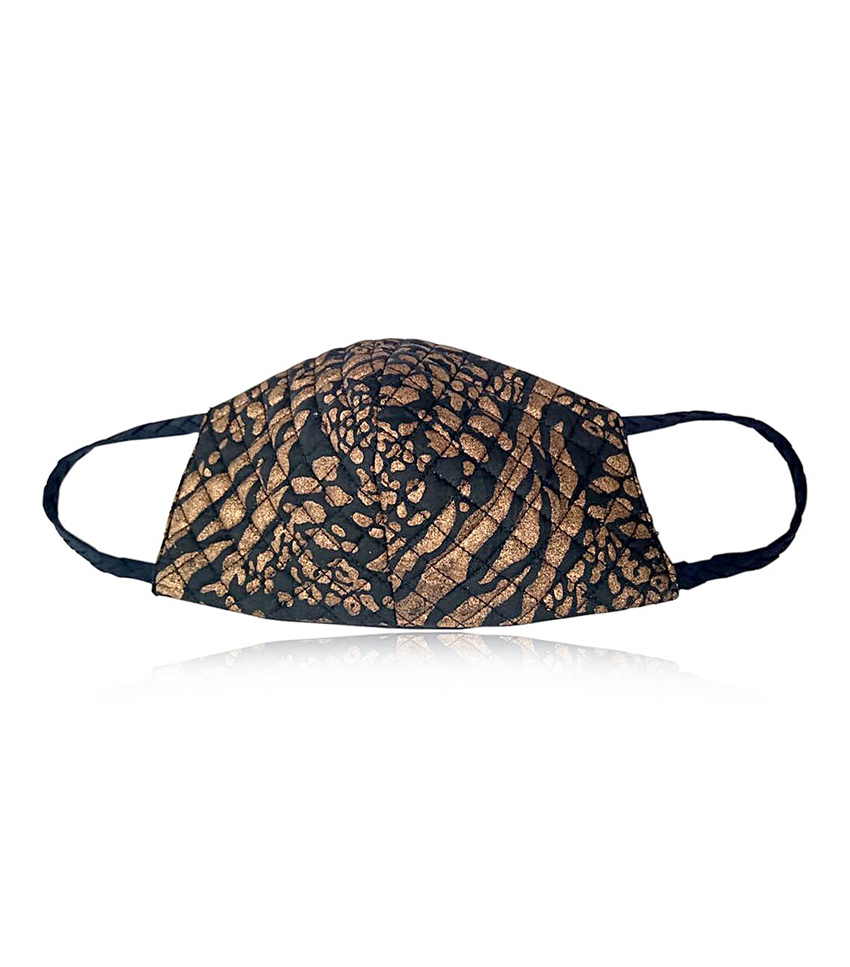
"This black silk mask is expertly hand quilted and digitally printed with a gold animal print. A very simplistic design that goes with almost any style."
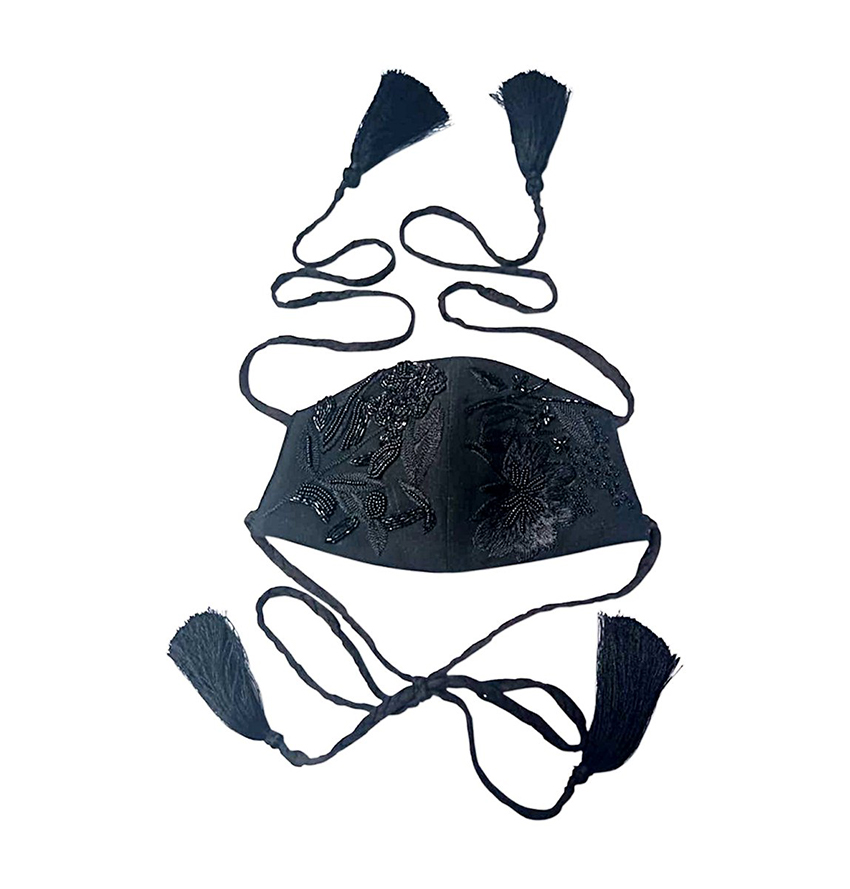
"This silk mask features a beautiful black embroidered floral scene with hand-braided silk tassels to tie around the face. The tassels create a truly unique silhouette, and the hand-embroidered pattern transforms a simple face mask to a beautiful statement piece."
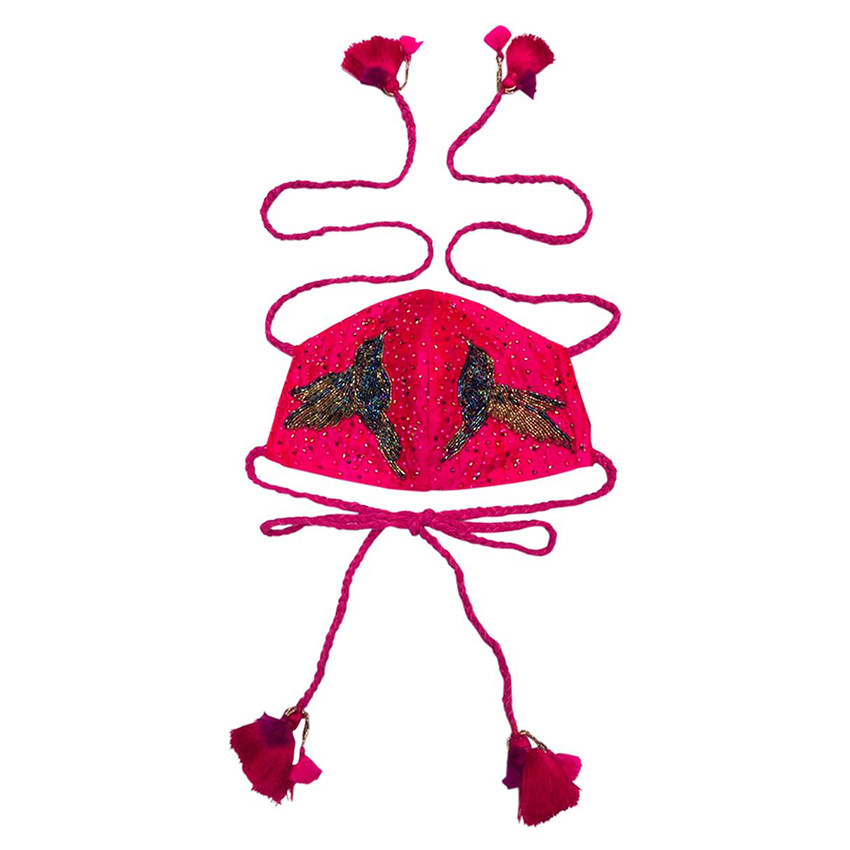
"Featuring two hand-embroidered parakeets and four hand-braided silk tassels to add an extra layer of beautiful detailing. This silk mask's bright color accentuates the hand-embroidered details and parakeet imagery."
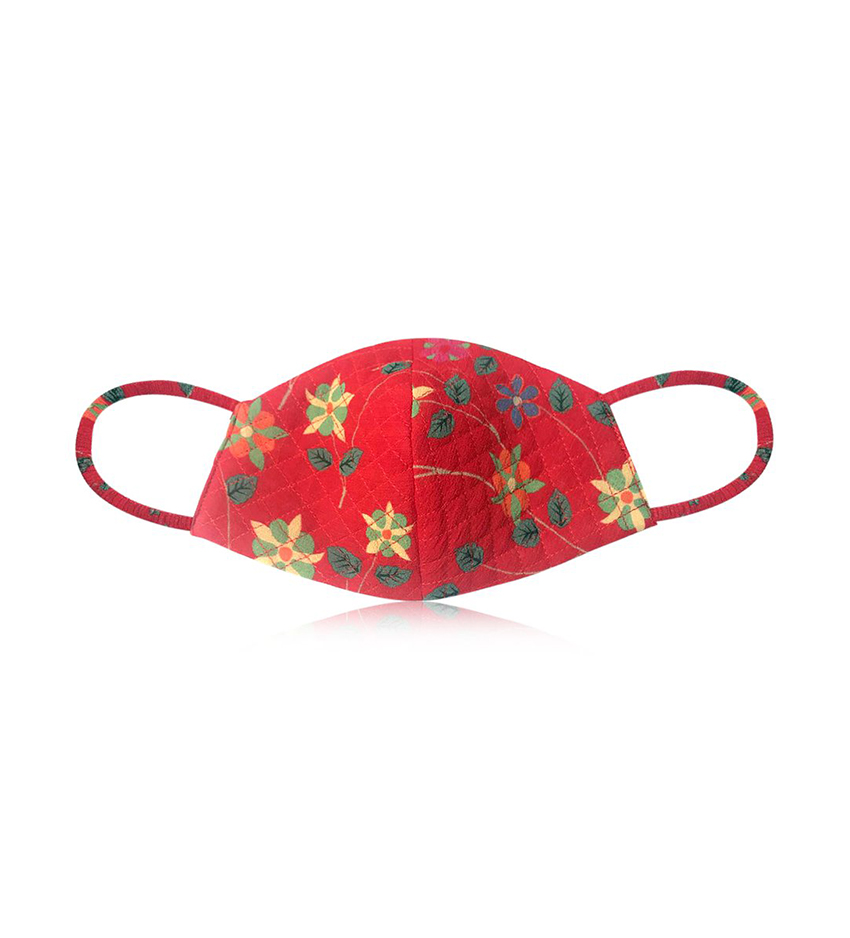
"Made from thin, breathable cotton, this mask is sustainably made from our leftover cotton fabrics."
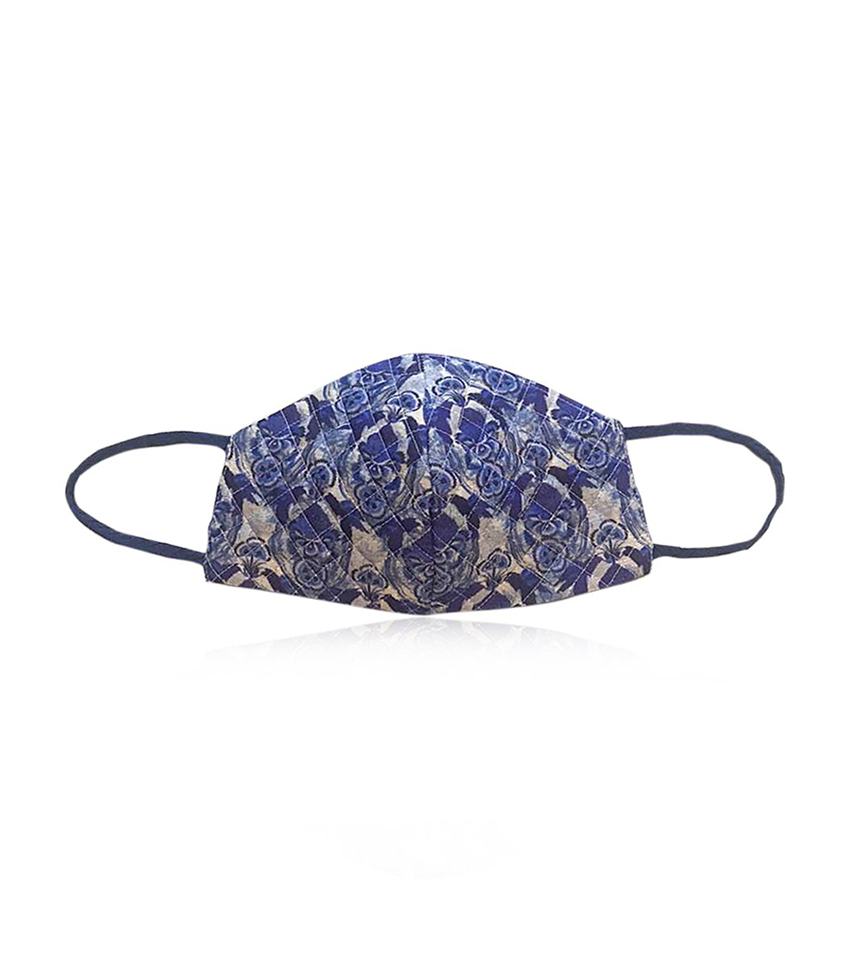
"Designed from 100% cotton, this mask shares the same pattern as our Neel garments from the Summer Garden collection, taking inspiration from eastern pottery with a deep blue and white pattern running throughout."
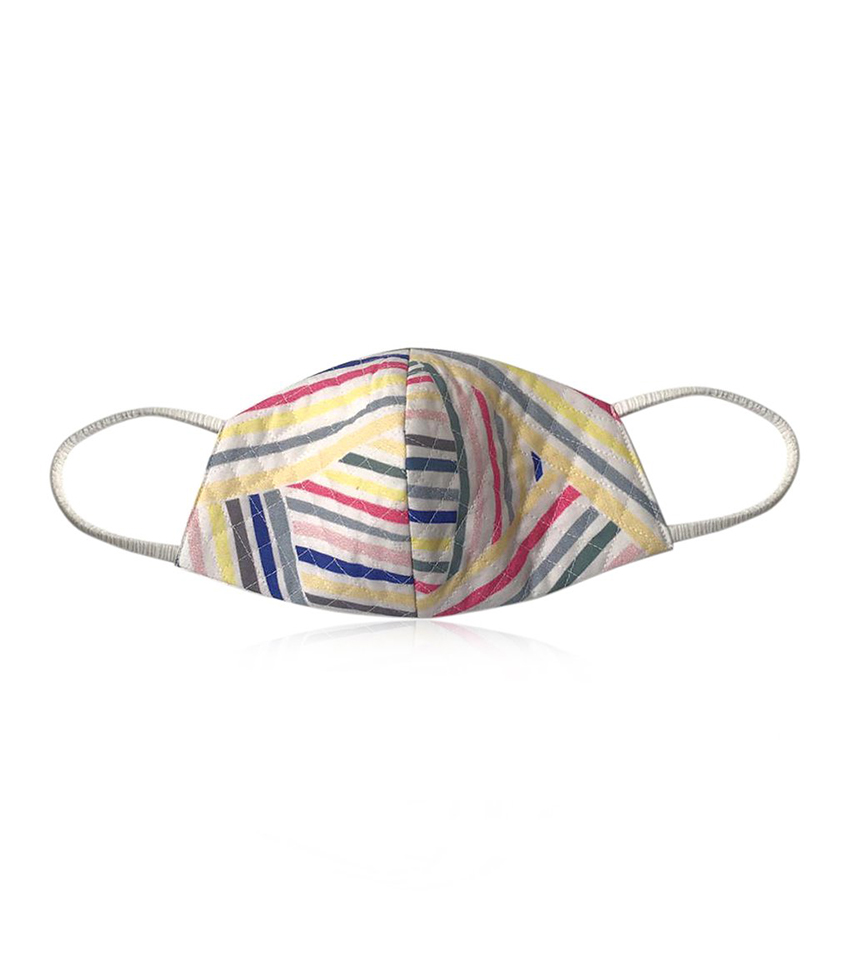
"Part of our summer mask collection, this mask is hand quilted and sustainably made from our leftover cotton fabrics."
Shop Roopa Pemmaraju Apparel
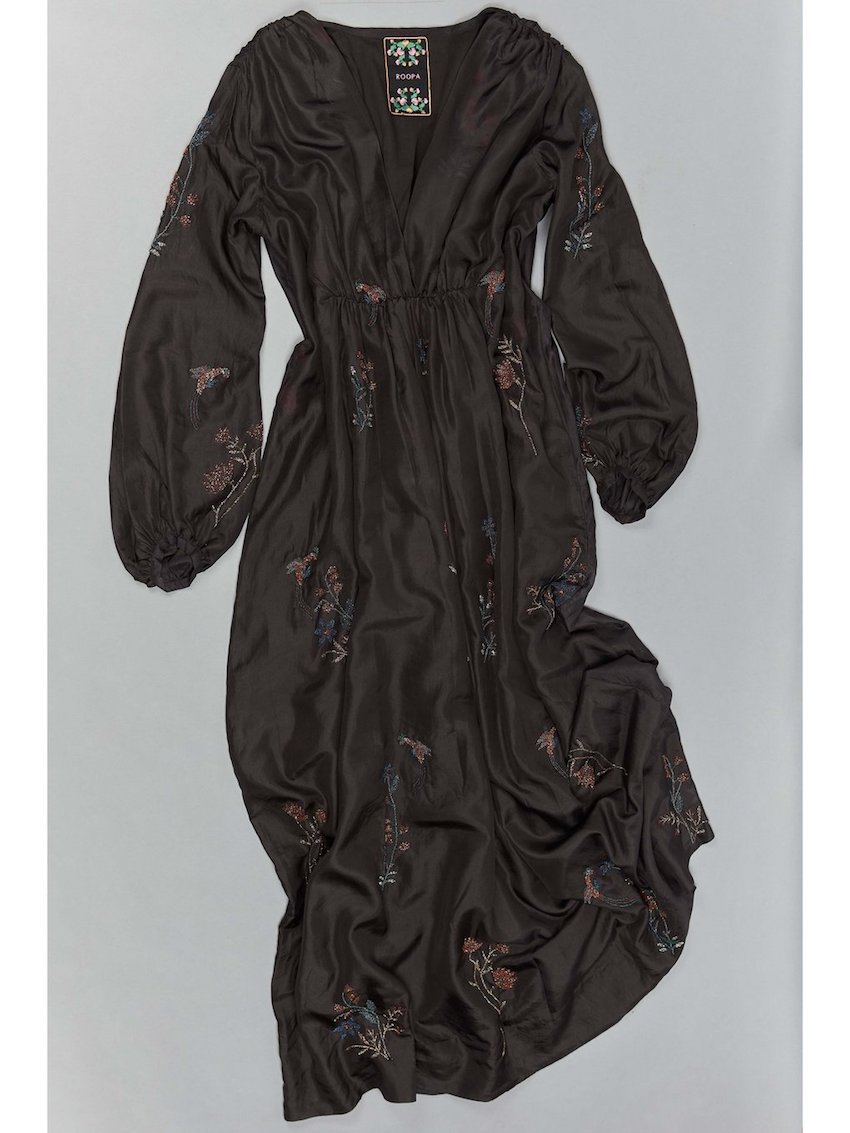
"From our new Night Bloom collection, the Moonflower Silk Dress comes with bishop sleeves, a gathered waist, gathered shoulder details, and delicately stitched night-bloom flowers and parakeet embroidery made with glass beads, metallic thread, and tiny beads."
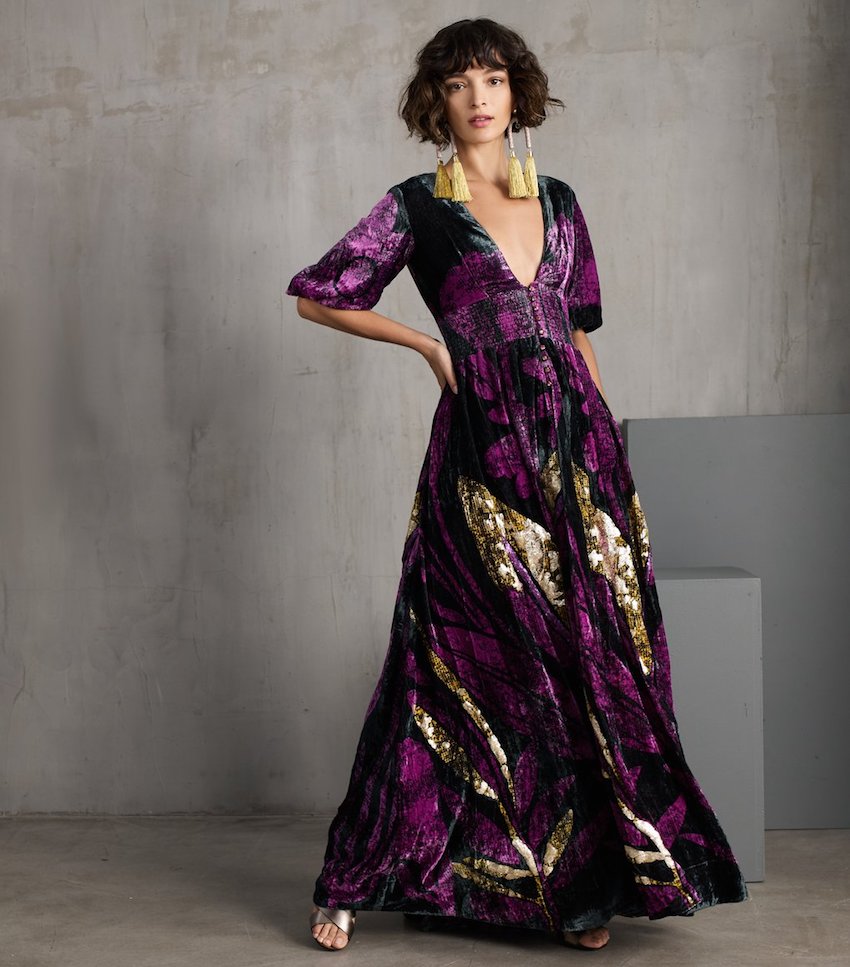
"Handcrafted using silk velvet, this maxi dress features a plunging V neckline, fitted bodice, and half-length poet sleeves. I love how much the gold and hand-embroidered details stand out against the purple and black."
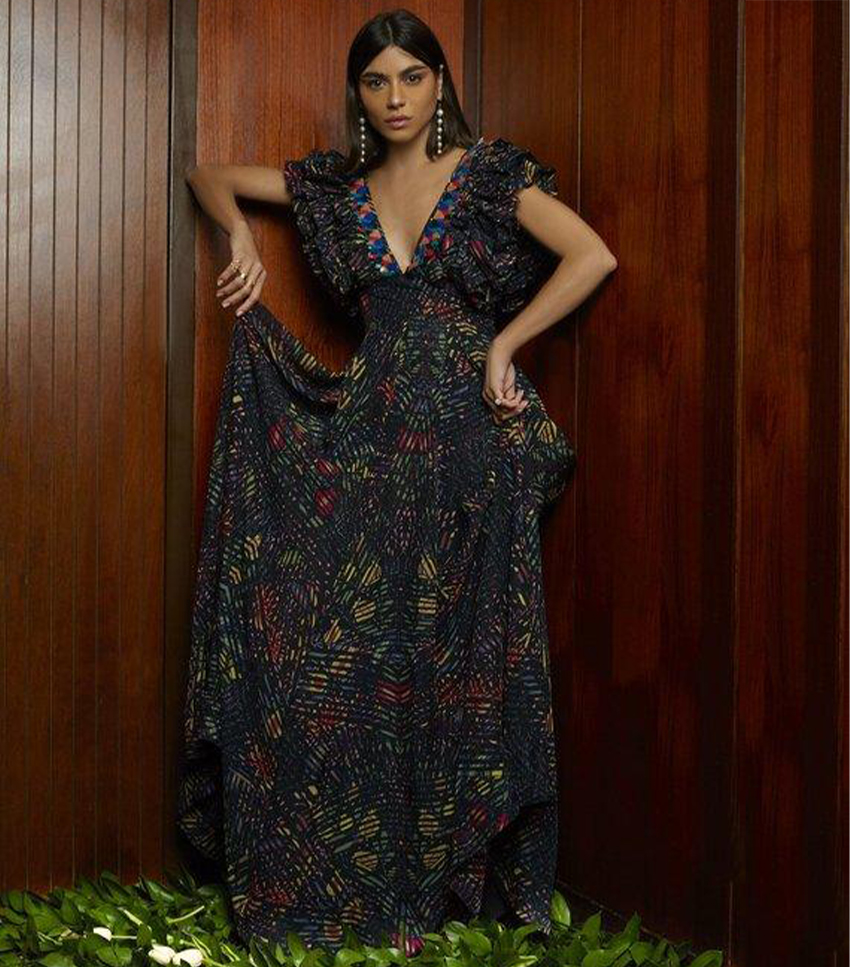
"My favorite part of this silk maxi gown from the Silk Road collection is the detailing around the neckline that stands out from the rest of the print."
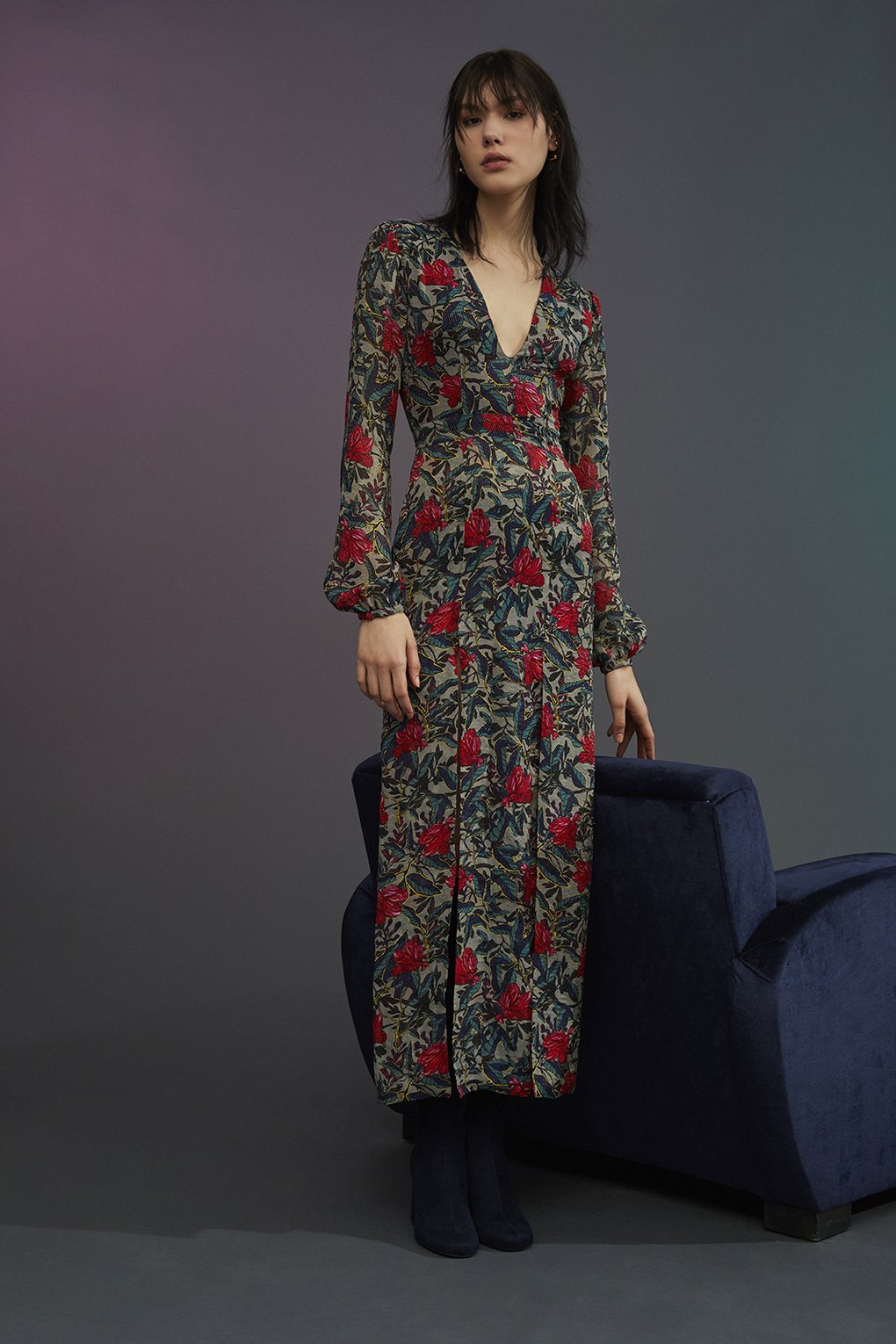
"The Hydrangea Metallic Silk Dress is from our Indian Garden collection. It showcases an incredible floral print with red flowers that really pop out through the muted background."
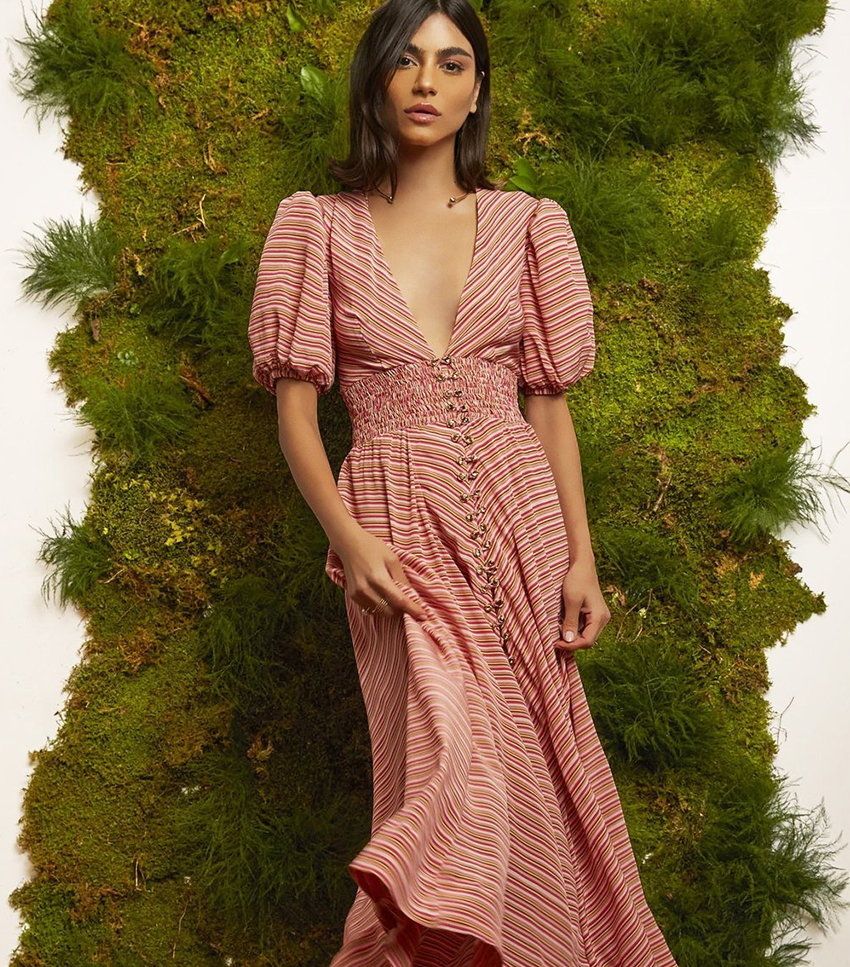
"This bias-cut dress from the Silk Road collection is 100% sustainably handcrafted using silk."

"The Lychnis Silk Printed Mini Dress perfectly showcases a lot of the age-old processes we use, such as handwoven silk tassels, hand embroidery, and a colorful floral print."
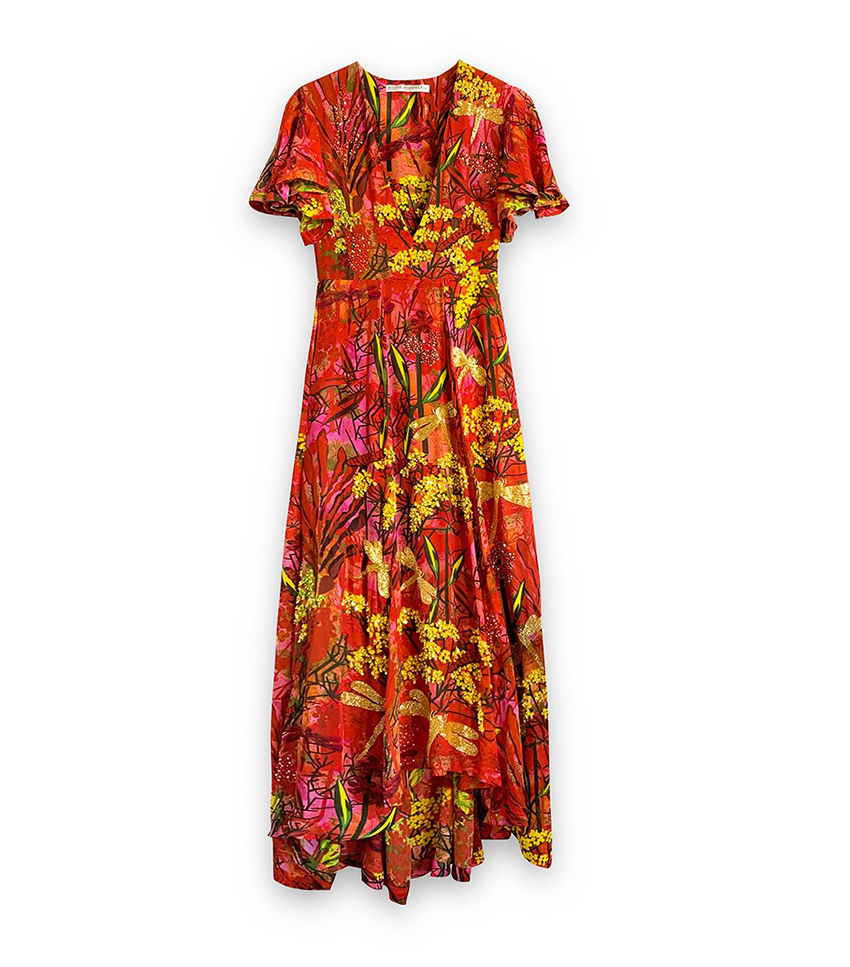
"This handcrafted, printed floral silk midi dress is from our Summer Garden collection."
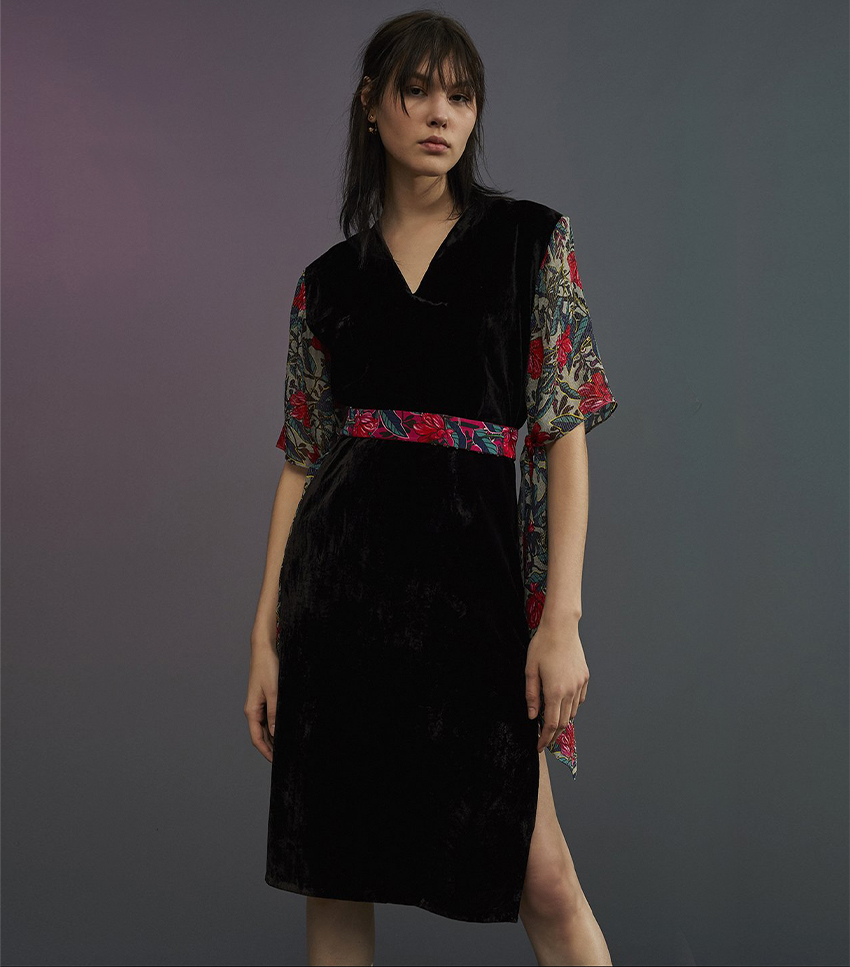
"This tie-up top is handcrafted by our team of artisans from silk velvet and floral-print silk georgette. The black velvet perfectly juxtaposes the floral pattern on the sleeves and the waistband."
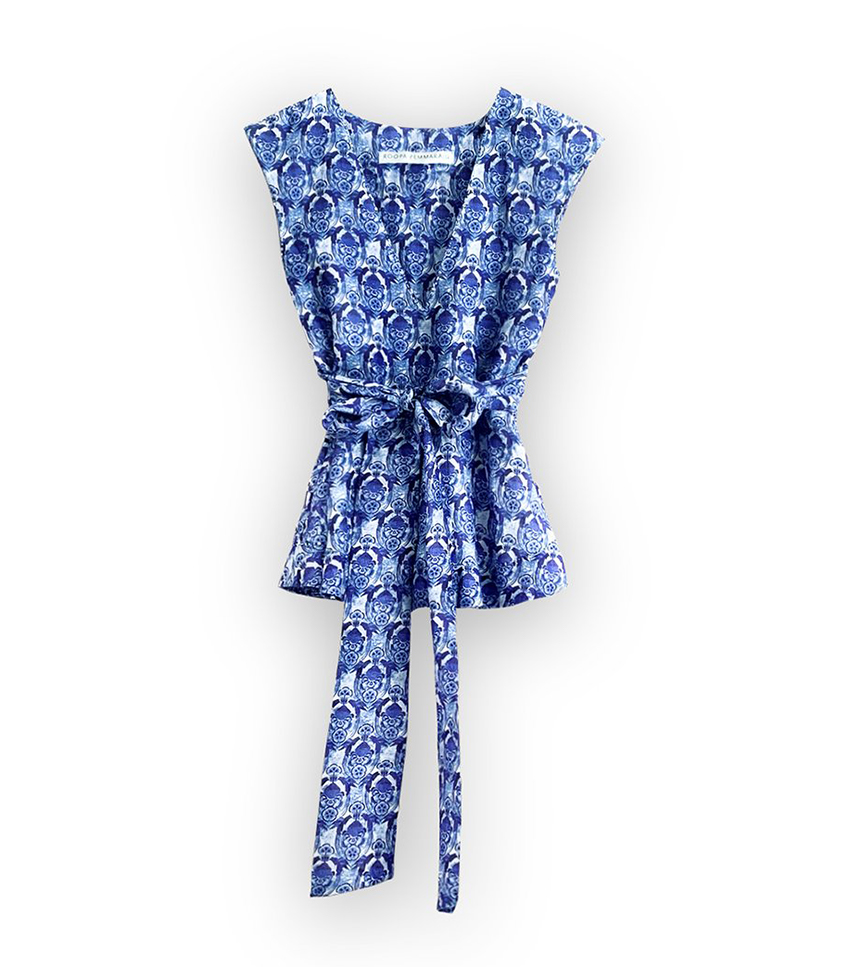
"From our Summer Garden collection, this cotton blouse is inspired by eastern pottery and the natural beauty and diversity of Indian wildflowers."
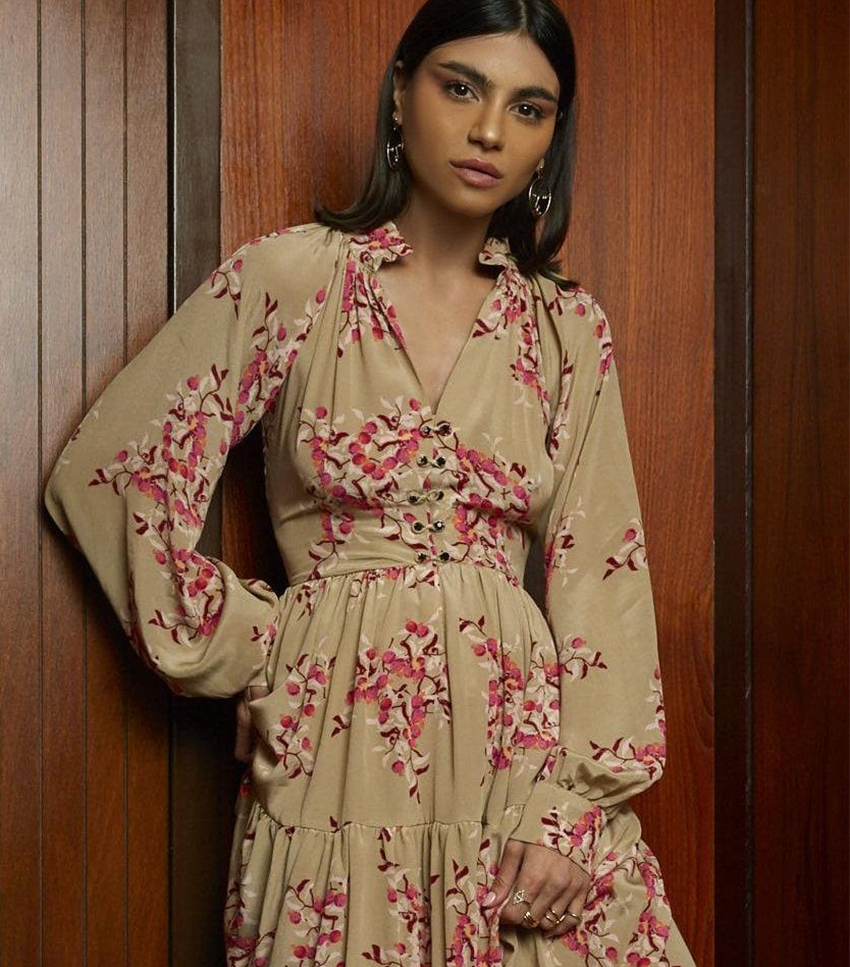
"From our Silk Road collection, this 100% silk knee-length dress features a close-collared ruffle neck, small pleats from the neckline to the waistline, front button closures, and a beautiful water spring flower print."
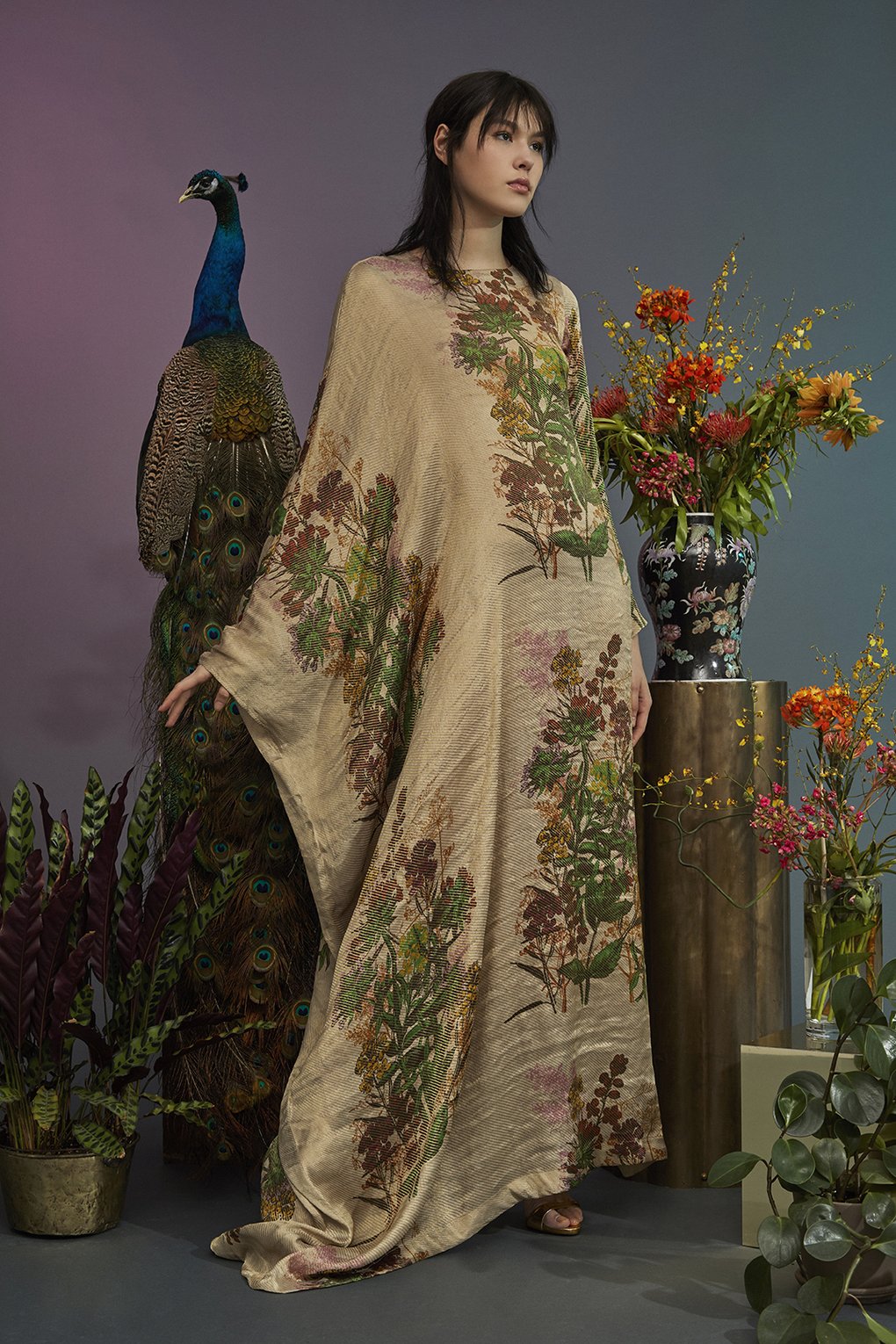
"The Indian Garden Gold Silk Gown from our Australian Indian Garden collection has a very interesting silhouette. The relaxed fit also has a high neckline, full sleeves, and back zip."
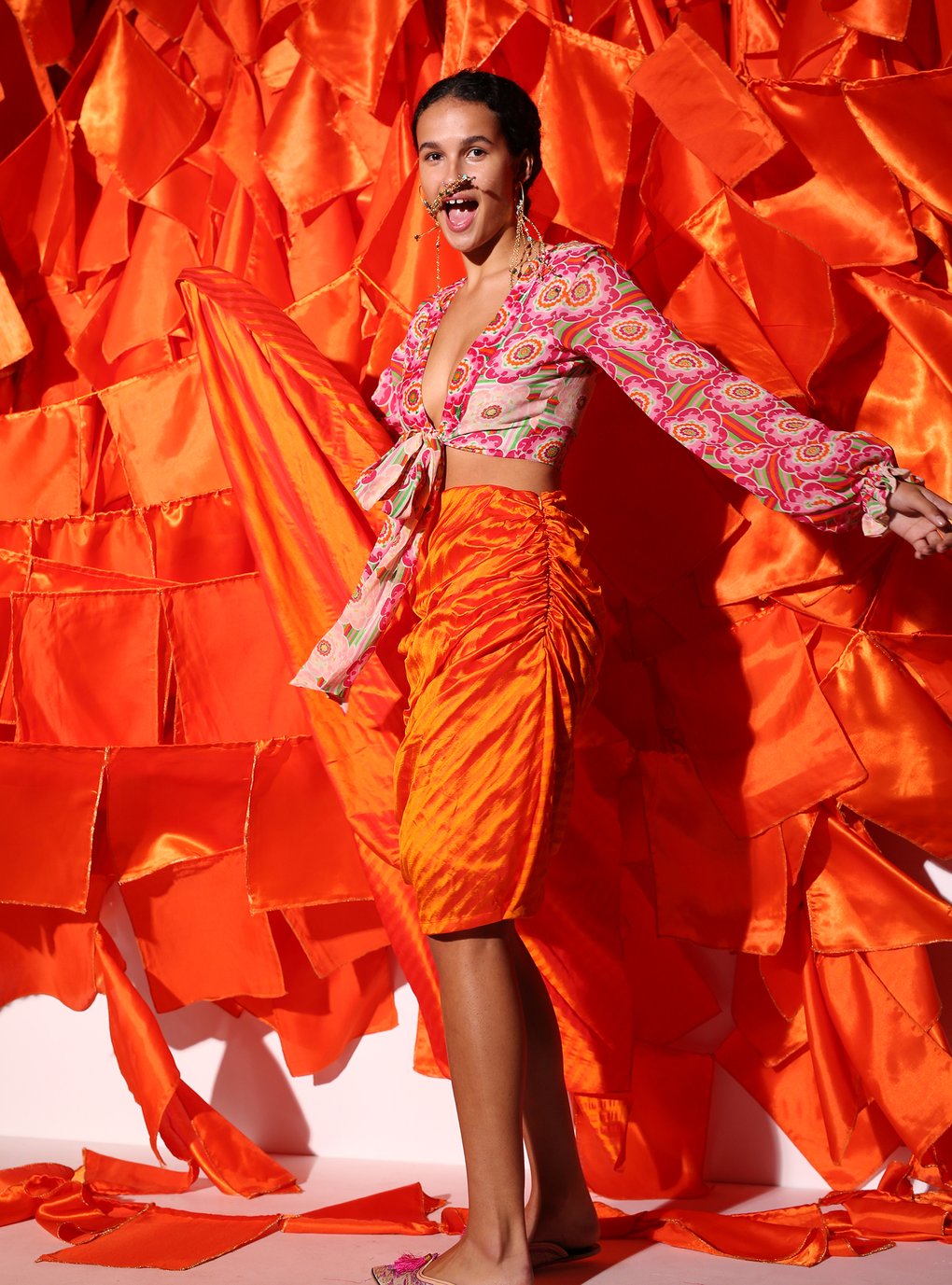
"Handcrafted from 100% jacquard silk, this miniskirt from the Padma collection features a train on one side and zip on the other. I love the unique silhouette and bright orange color of this garment. I think this miniskirt is a great statement piece."
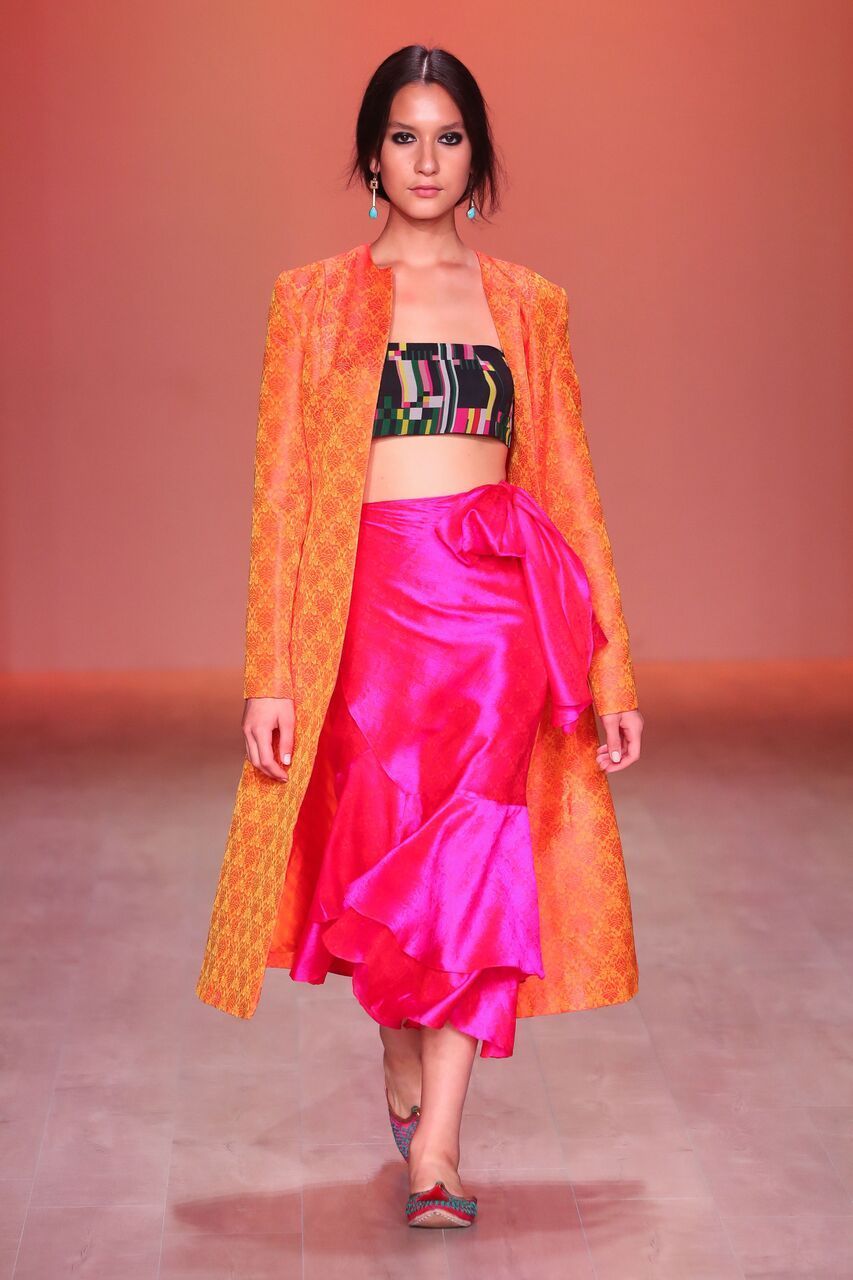
"This midi wrap silk skirt from our Padma collection is inspired by the Himalayan region of Nepal. The bright colors and more subdued pattern of this skirt is great for adding some depth to a darker-colored outfit."
Up Next: You May Have Never Heard of This NYC Brand, But Bella Hadid and Dua Lipa Have
Aralyn Beaumont joined Who What Wear as the copy editor for branded content after a career in food media. Years of poring over intricate recipes with a fine-tooth comb and working with high-profile chefs has prepared her well for working with fashion's top brands while honoring Who What Wear's voice. Her background as a research editor makes her a finicky editor who will probably care too much about making sure all copy is as factually accurate and aligned with the house style guide as can be. Maybe it's because she's a Gemini, but her personal style is impossible to pin down: One day you'll see her in a turtleneck sweater tucked into a midi skirt with heeled boots, and the next, she'll be wearing mom jeans, a white Hanes tee, and classic Vans. At the end of the day, her style reflects her various moods. Sometimes it will be feminine and elegant, and others it will be grungy or androgynous. Certain things will always remain constant, though. She'll forever be on the hunt for the perfect pair of high-waisted jeans.
-
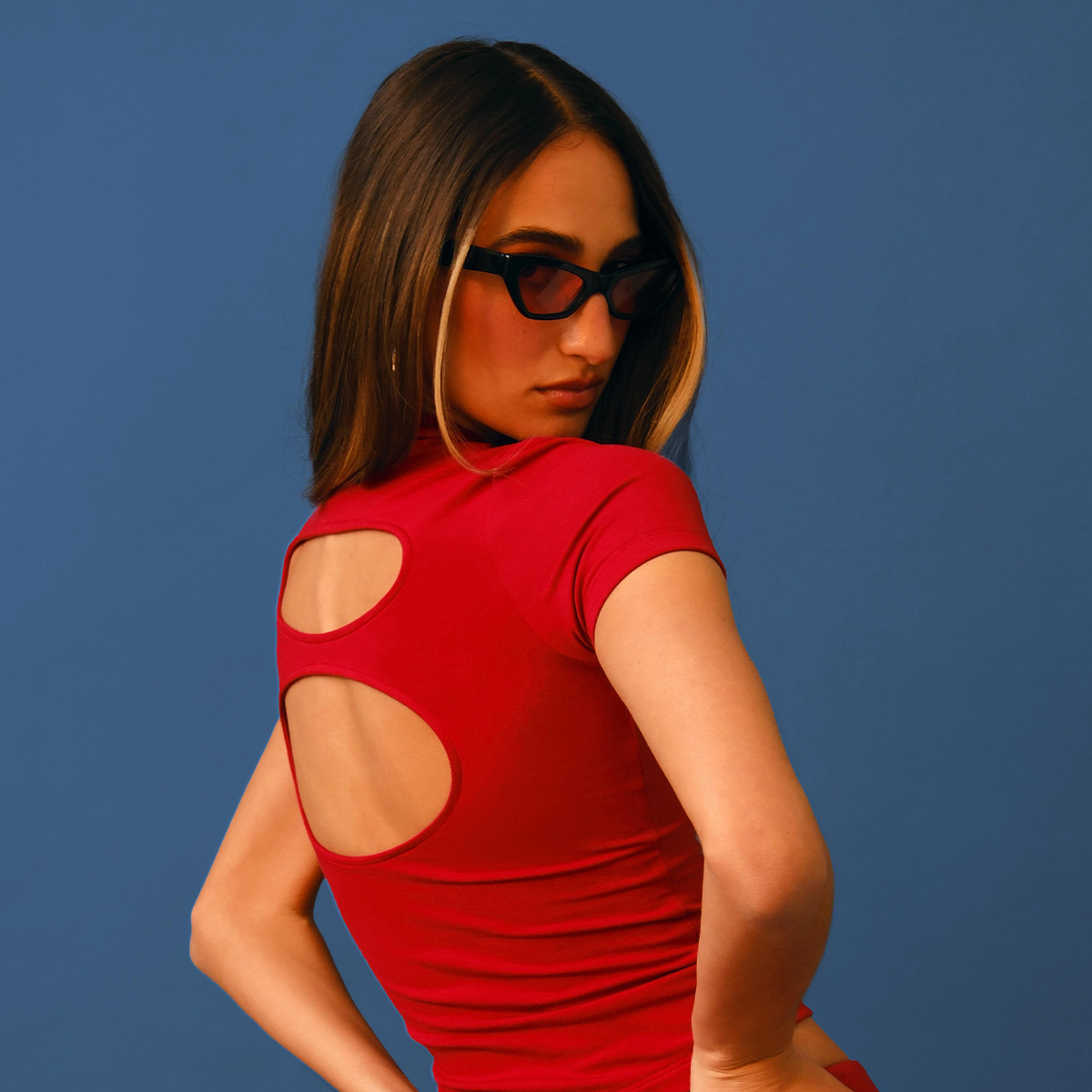 12 Chic Independent Designers to Support Now and Always
12 Chic Independent Designers to Support Now and AlwaysBoth at home and abroad.
By Ana Escalante
-
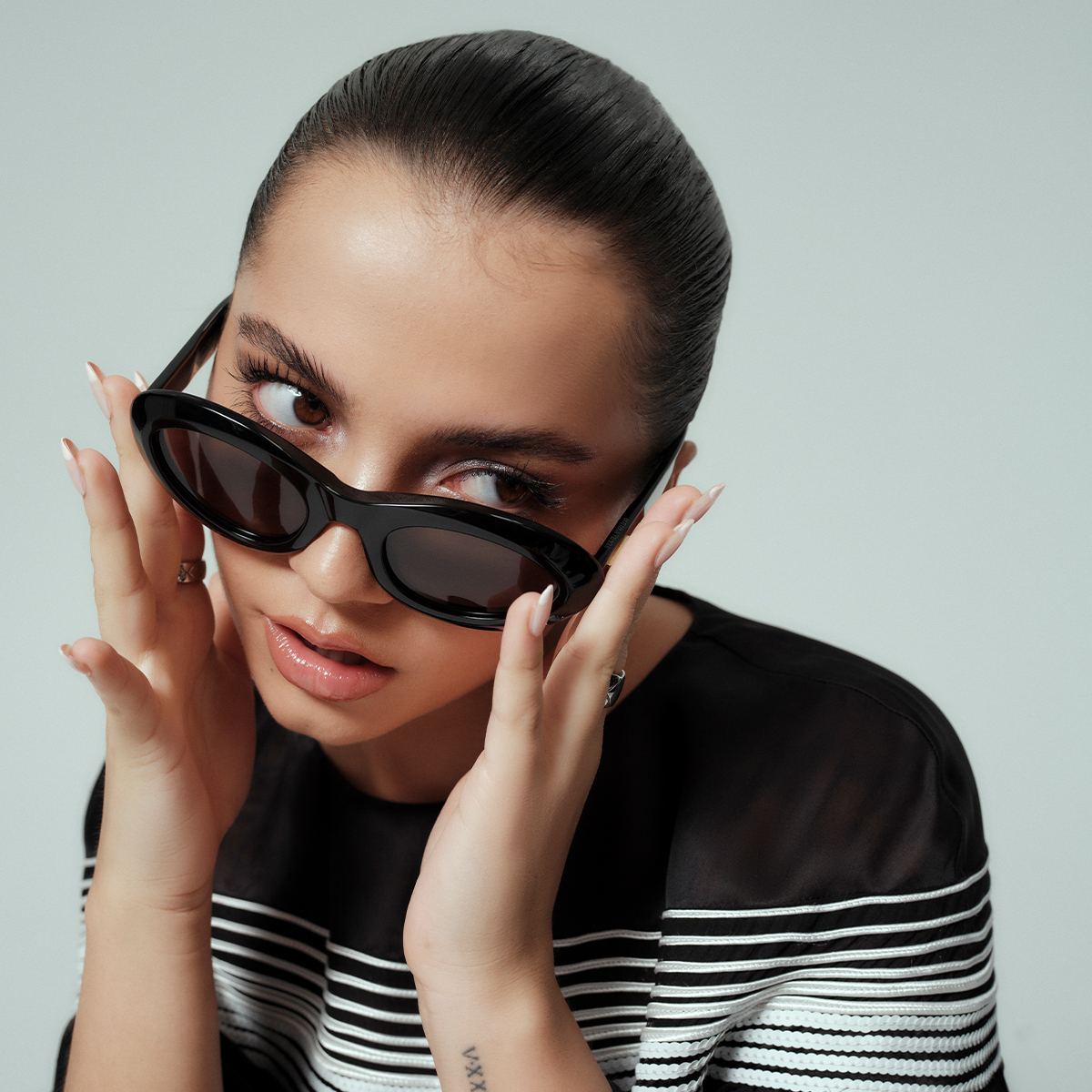 Isabela Merced Is Pushing Herself to New Limits
Isabela Merced Is Pushing Herself to New LimitsThe Turtles All the Way Down actor is about to be everywhere.
By Jessica Baker
-
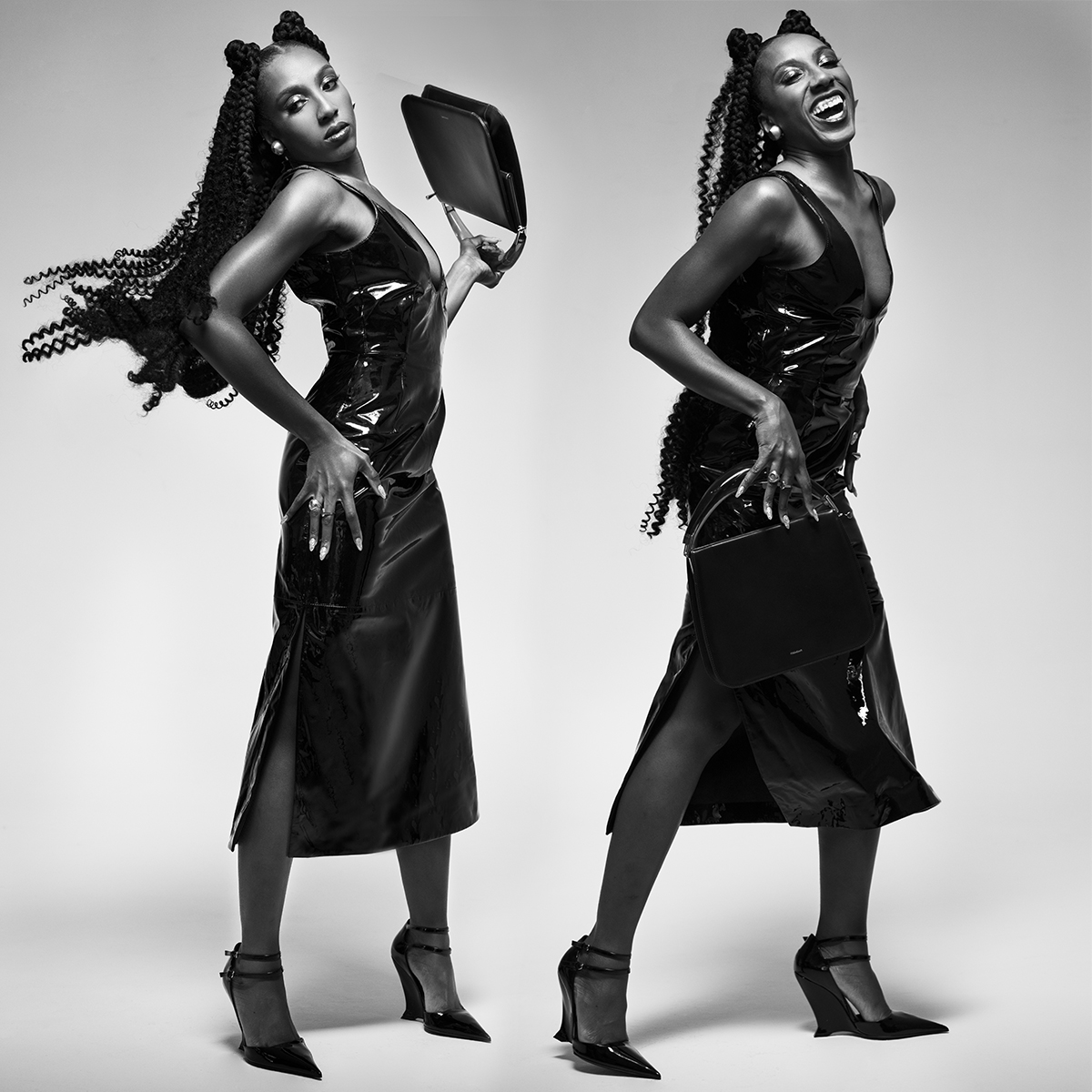 Ziwe Really "Freaked It" With Her Hilarious First Book, Black Friend: Essays
Ziwe Really "Freaked It" With Her Hilarious First Book, Black Friend: EssaysWikiFeet scores, a Jordan Peele–esque essay, and more.
By Jessica Baker
-
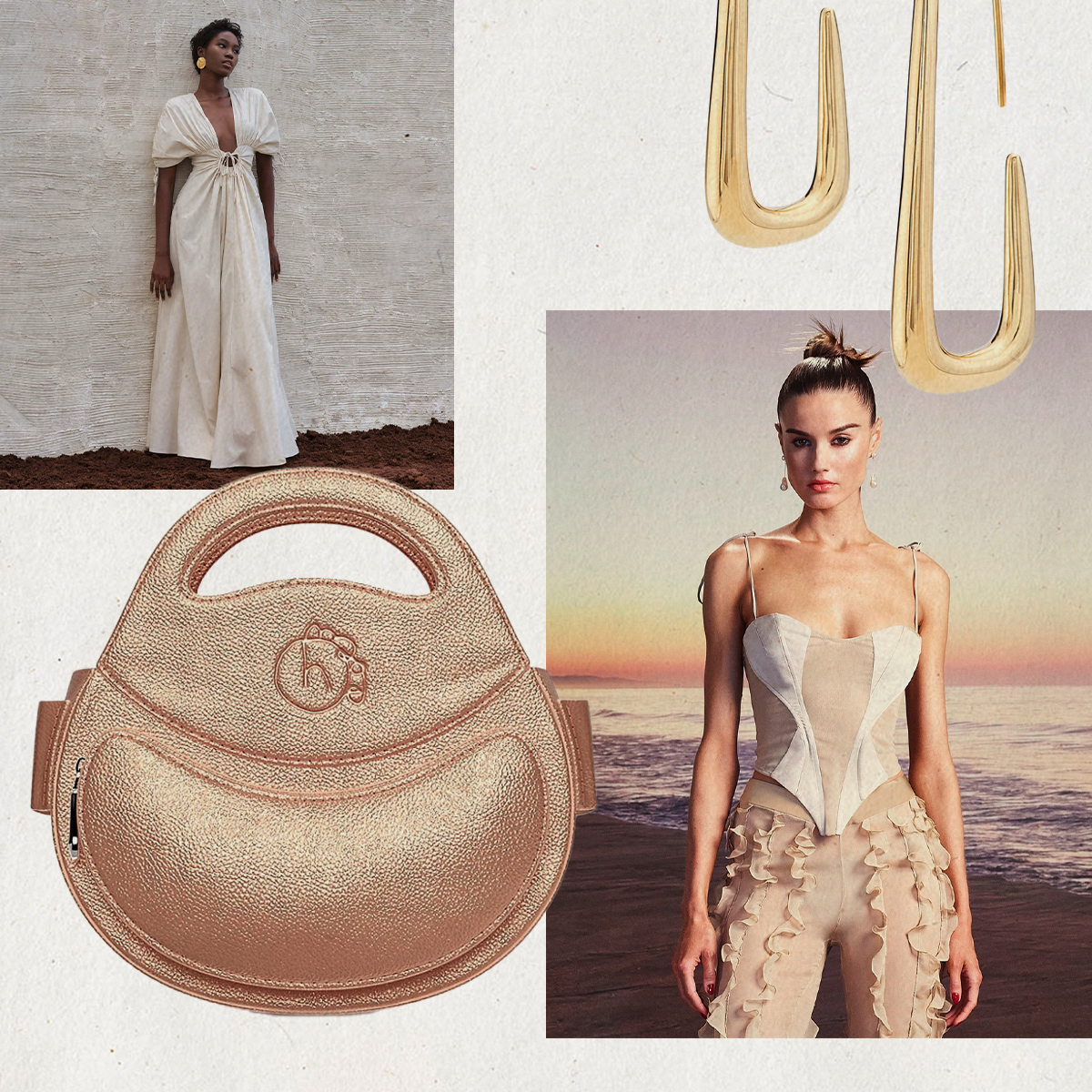 48 Fabulous Finds From the Black-Owned Brands I'm Obsessed With Right Now
48 Fabulous Finds From the Black-Owned Brands I'm Obsessed With Right NowThey're unique.
By Jasmine Fox-Suliaman
-
 7 Greek Swimwear Brands Everyone's Talking About Right Now
7 Greek Swimwear Brands Everyone's Talking About Right NowGreece is calling…
By Jasmine Fox-Suliaman
-
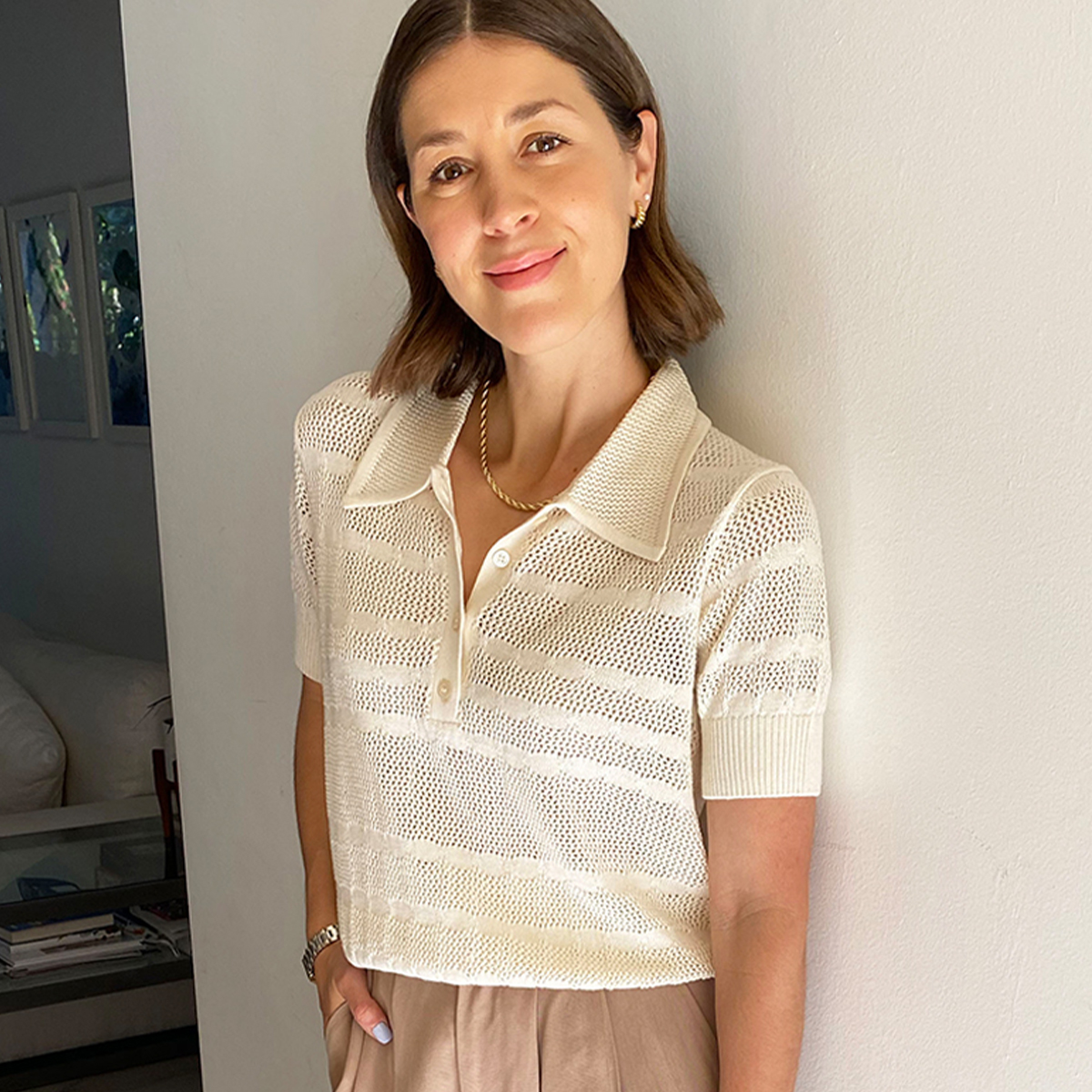 I Love This $128 Top So Much That I Accidentally Just Wore It 3 Days in a Row
I Love This $128 Top So Much That I Accidentally Just Wore It 3 Days in a RowSorry, not sorry.
By Judith Jones
-
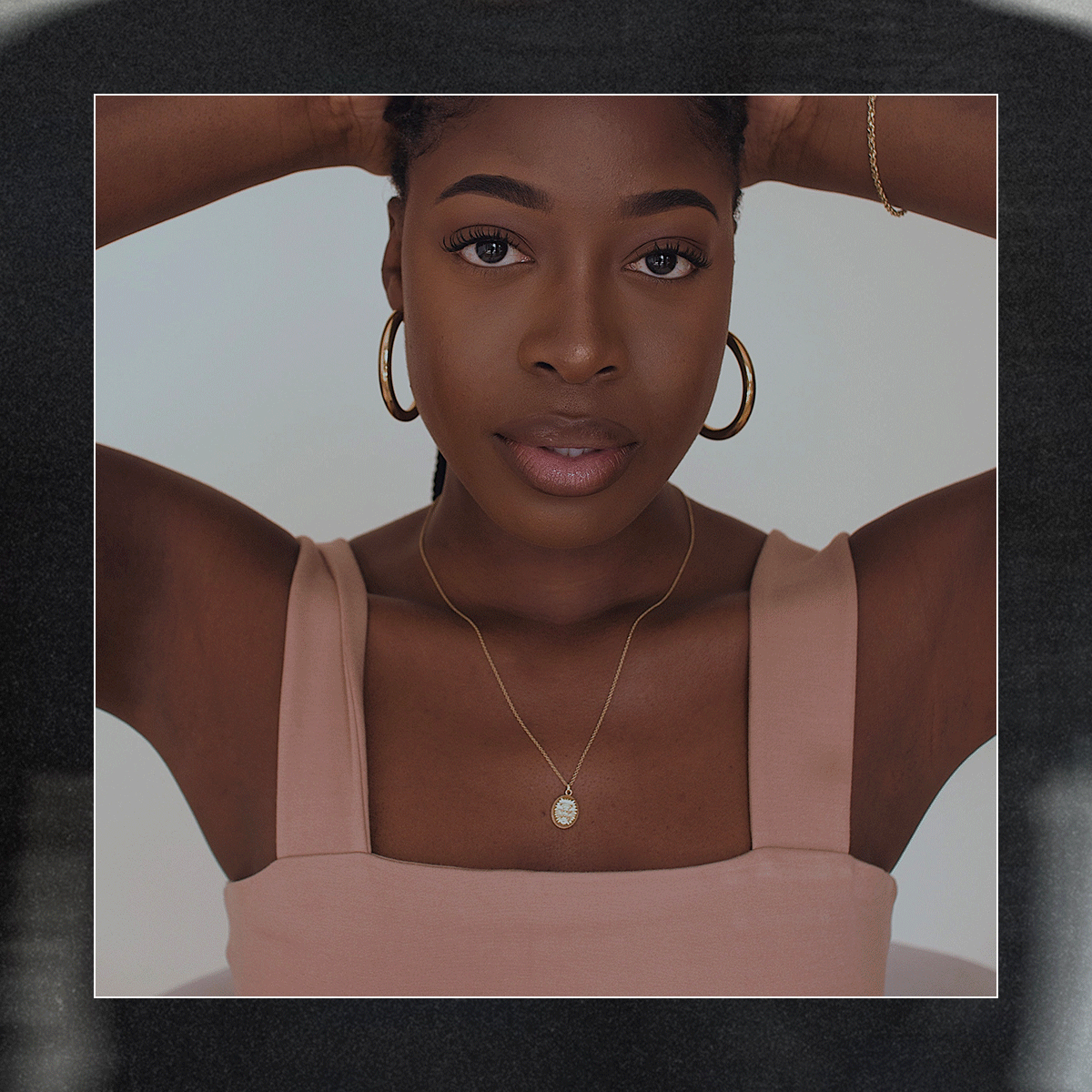 Meet the Fashion-Industry Leaders Paving the Way for Future Black Creatives
Meet the Fashion-Industry Leaders Paving the Way for Future Black CreativesInclusivity isn't a trend for them.
By Jasmine Fox-Suliaman
-
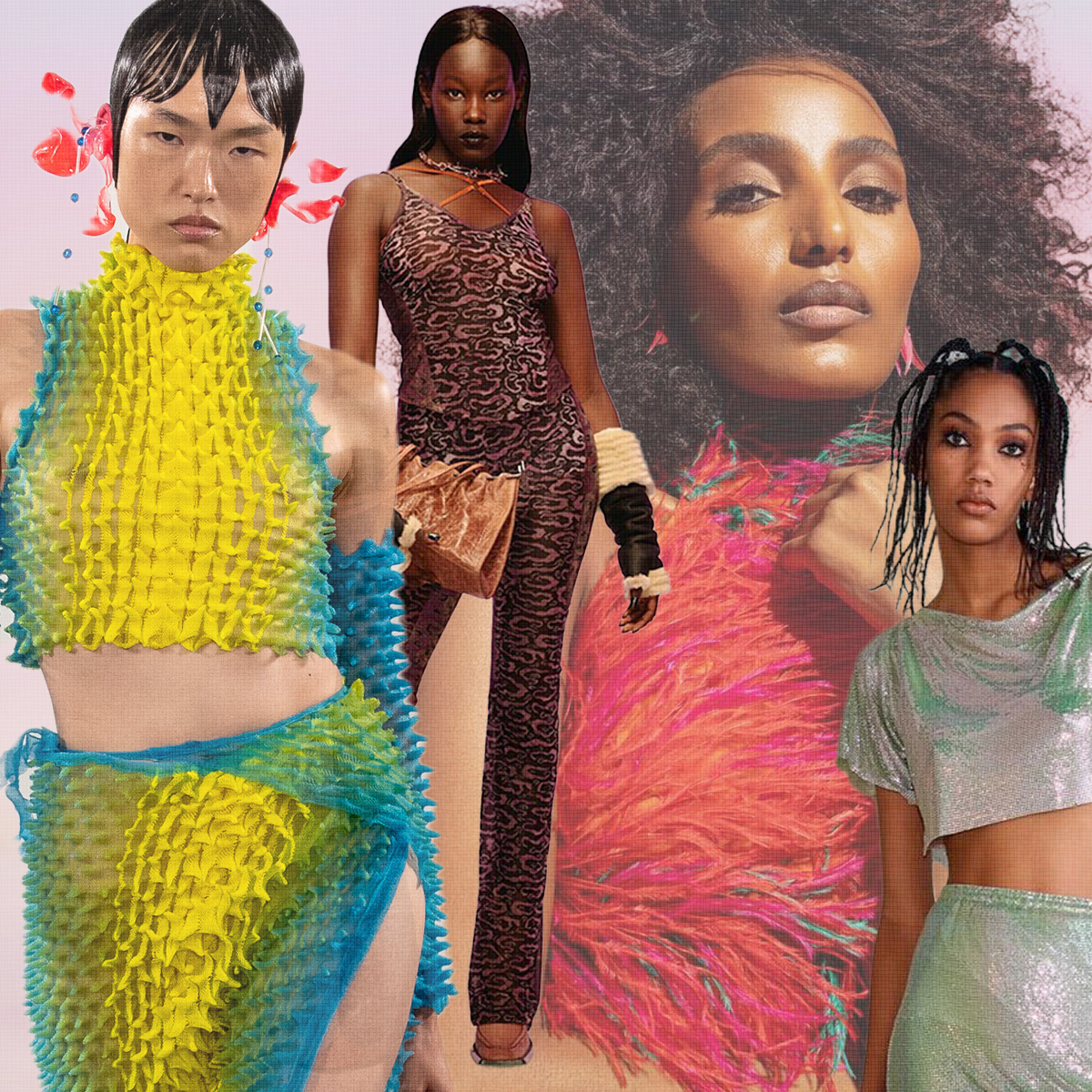 We're Fashion Buyers, and We're Telling You These 12 Brands Are Worth Your Time
We're Fashion Buyers, and We're Telling You These 12 Brands Are Worth Your TimeIYKYK.
By Jasmine Fox-Suliaman

